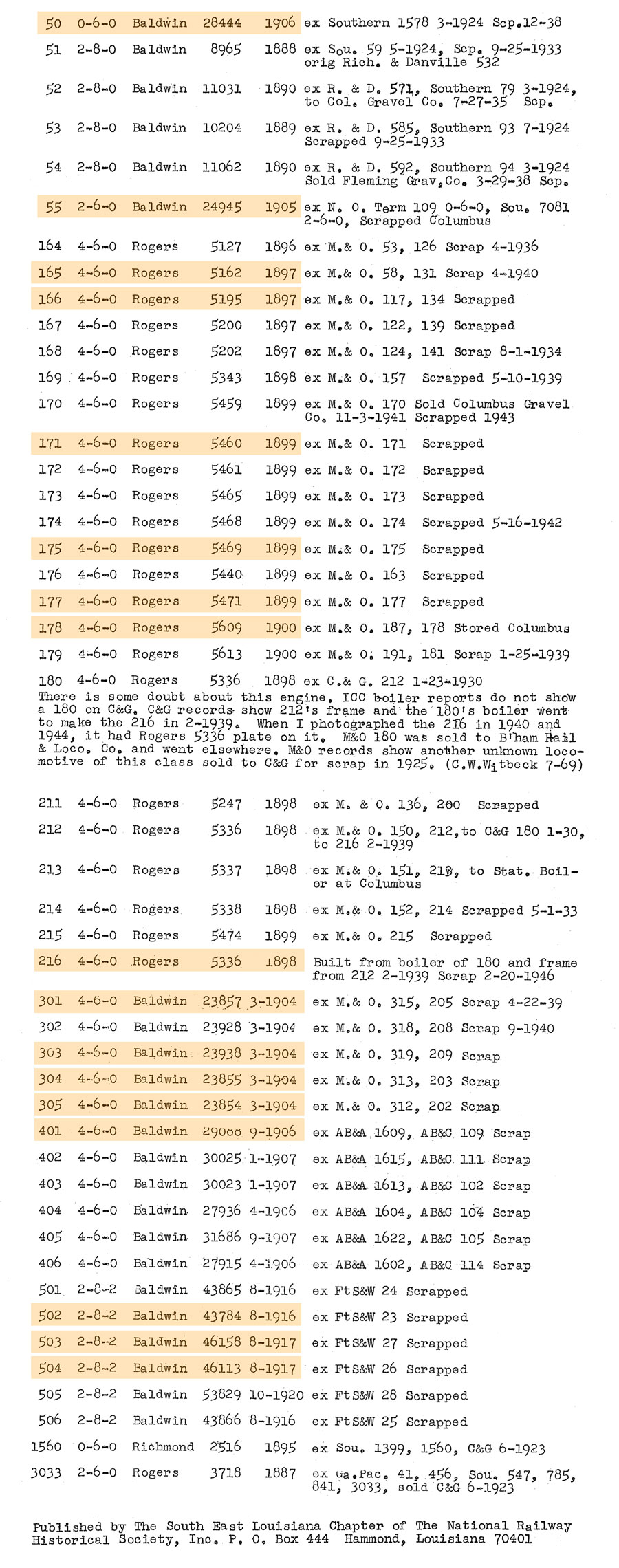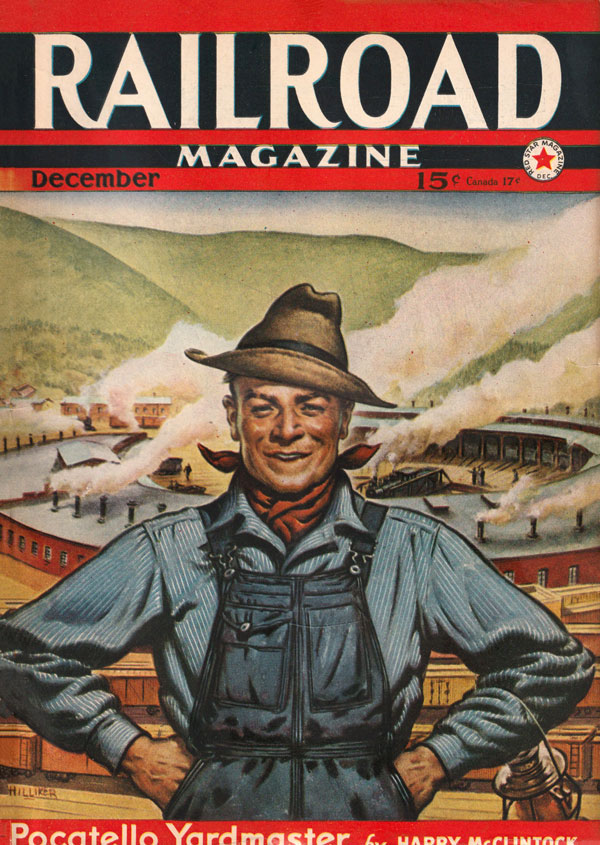
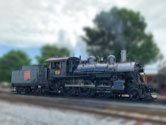

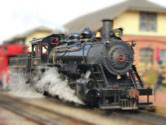
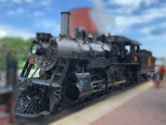
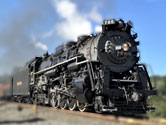
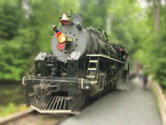
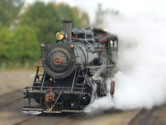
Steam
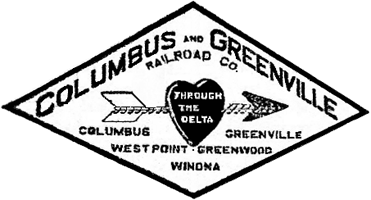 Columbus & Greenville Railway
Columbus & Greenville Railway
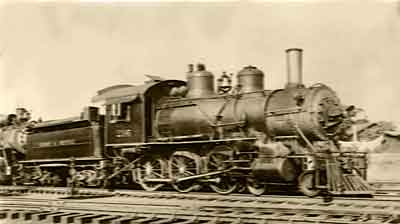
 etween 1924 and 1945 — the first two decades of the original, independent Columbus & Greenville Railway — the Delta Route powered all of its trains with second-hand steam locomotives. Indeed, it would not be until the historic Baldwin road-switcher order of 1945 that the C&G could afford new equipment delivered to Columbus from the factory. As for steam, the principal year of acquisition was 1923, shortly after forming the company, when the road secured from several sources a large batch of Consolidations, Moguls, and Ten-Wheelers to move both its freight and passenger movements. Seven locomotives were purchased from former parent Southern Railway, and an impressive 23 steamers were secured from mainline neighbor and interchange partner Mobile & Ohio. The early 1930s saw another batch of ex-Mobile & Ohio Ten-Wheelers, and in 1938 Columbus forces purchased six more 4-6-0s — ex Atlanta, Birmingham & Coast locomotives secured through an Atlanta equipment dealer, these Ten-wheelers heavier than all previous. One year later, the C&G made what would be its final steam purchase, securing six handsome Mikados through a dealer from the bankrupt Ft. Smith & Western in Arkansas. More powerful and reliable than any previous power, the Mikes served the road well right up into the Baldwin diesel era.
etween 1924 and 1945 — the first two decades of the original, independent Columbus & Greenville Railway — the Delta Route powered all of its trains with second-hand steam locomotives. Indeed, it would not be until the historic Baldwin road-switcher order of 1945 that the C&G could afford new equipment delivered to Columbus from the factory. As for steam, the principal year of acquisition was 1923, shortly after forming the company, when the road secured from several sources a large batch of Consolidations, Moguls, and Ten-Wheelers to move both its freight and passenger movements. Seven locomotives were purchased from former parent Southern Railway, and an impressive 23 steamers were secured from mainline neighbor and interchange partner Mobile & Ohio. The early 1930s saw another batch of ex-Mobile & Ohio Ten-Wheelers, and in 1938 Columbus forces purchased six more 4-6-0s — ex Atlanta, Birmingham & Coast locomotives secured through an Atlanta equipment dealer, these Ten-wheelers heavier than all previous. One year later, the C&G made what would be its final steam purchase, securing six handsome Mikados through a dealer from the bankrupt Ft. Smith & Western in Arkansas. More powerful and reliable than any previous power, the Mikes served the road well right up into the Baldwin diesel era.

See also our complete Columbus & Greenville featured scrapbook in Shortlines
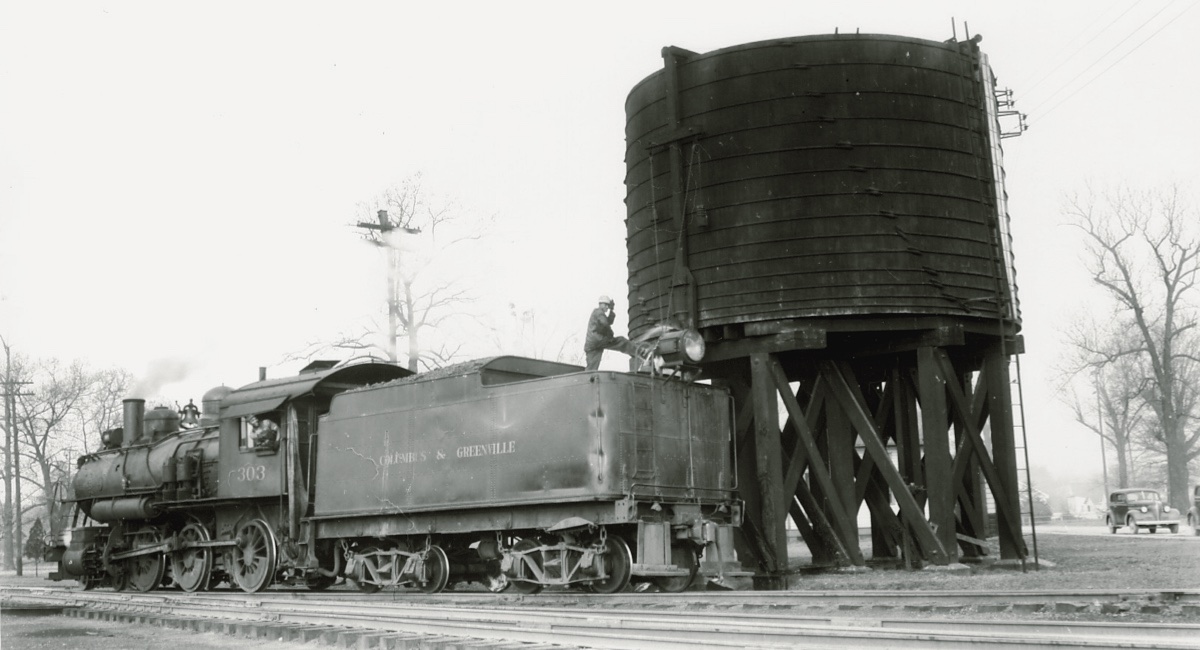
Columbus, Ms / 1944 / collection
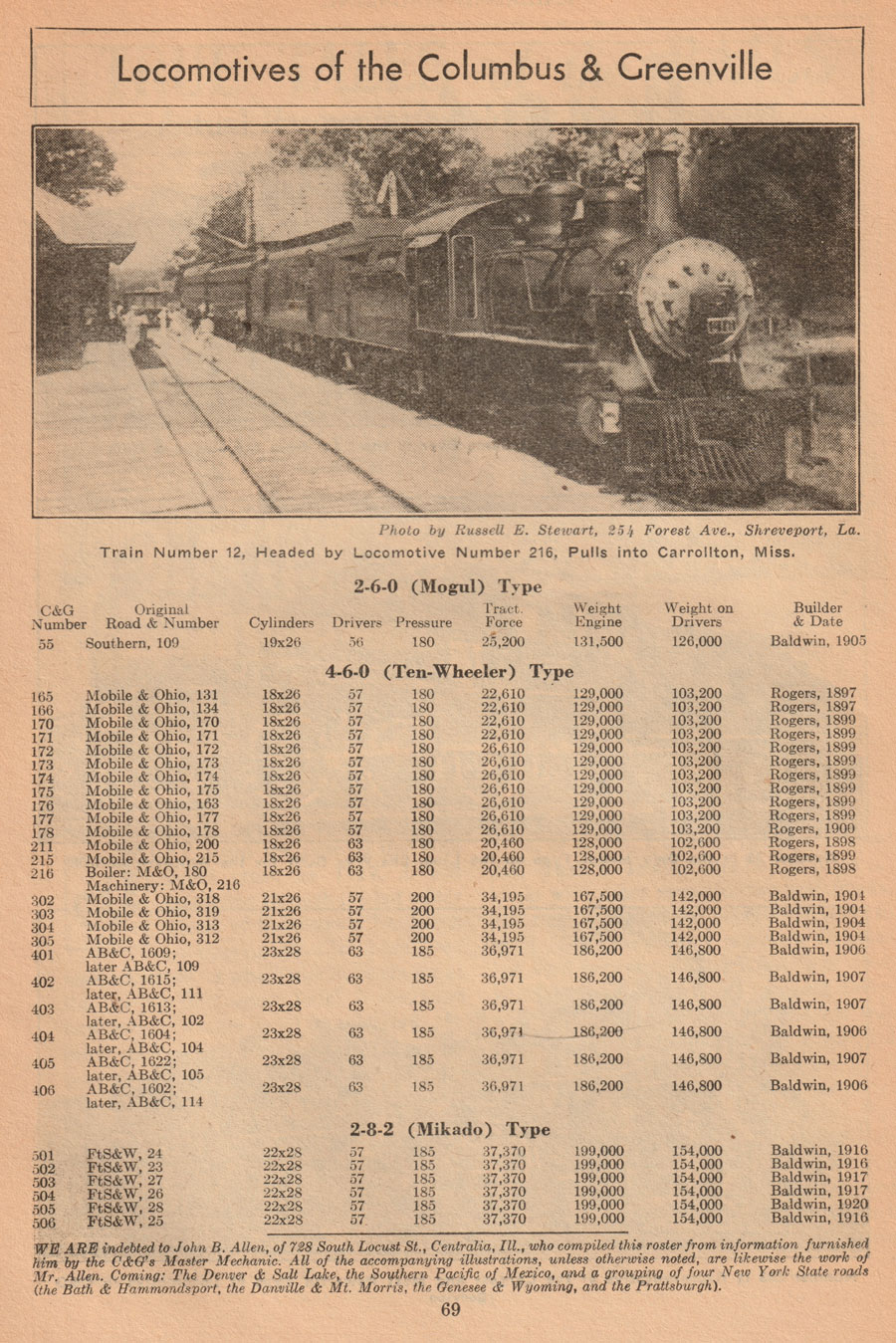
from Railroad
magazine - Dec 1940 / collection
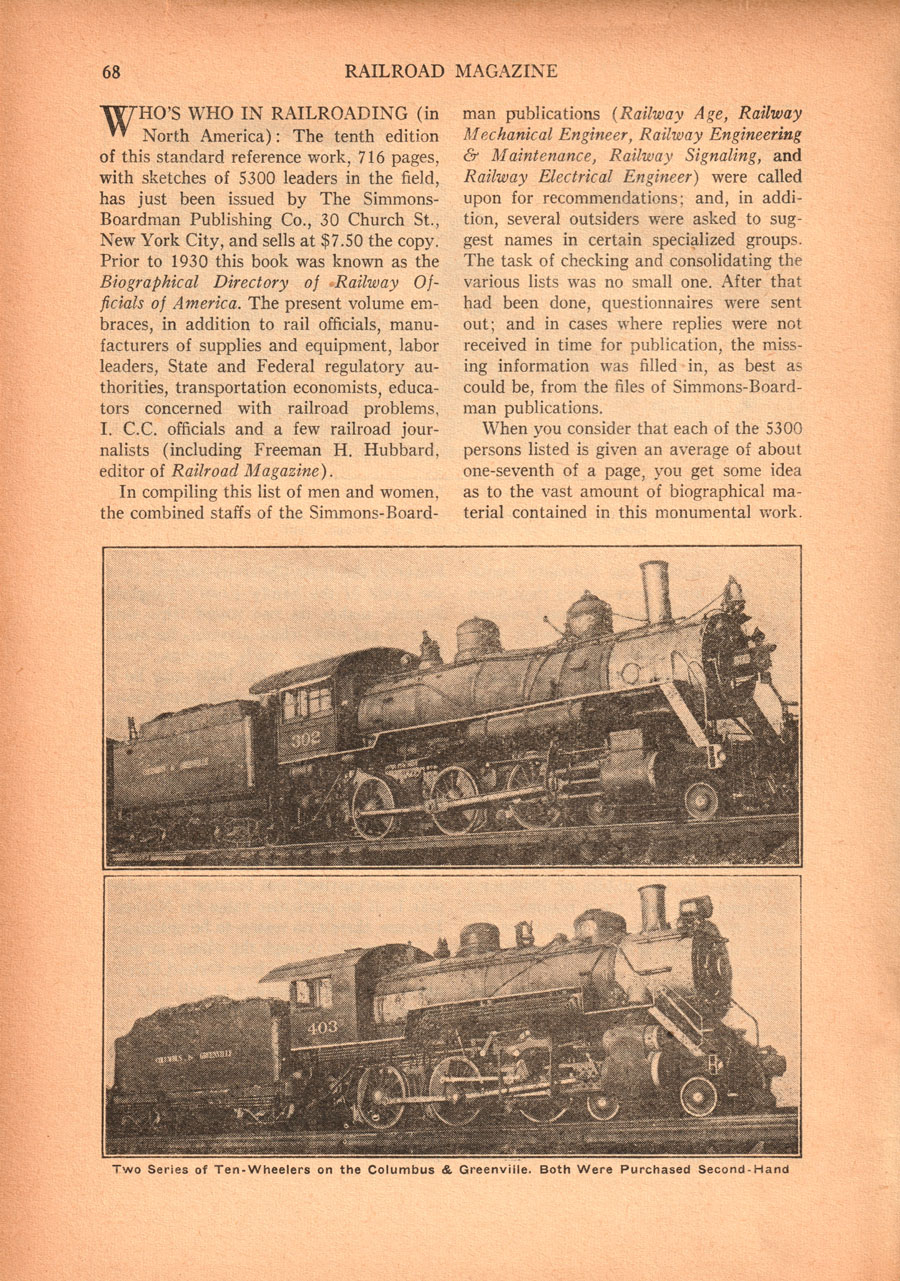
from Railroad
magazine - Dec 1940 / collection
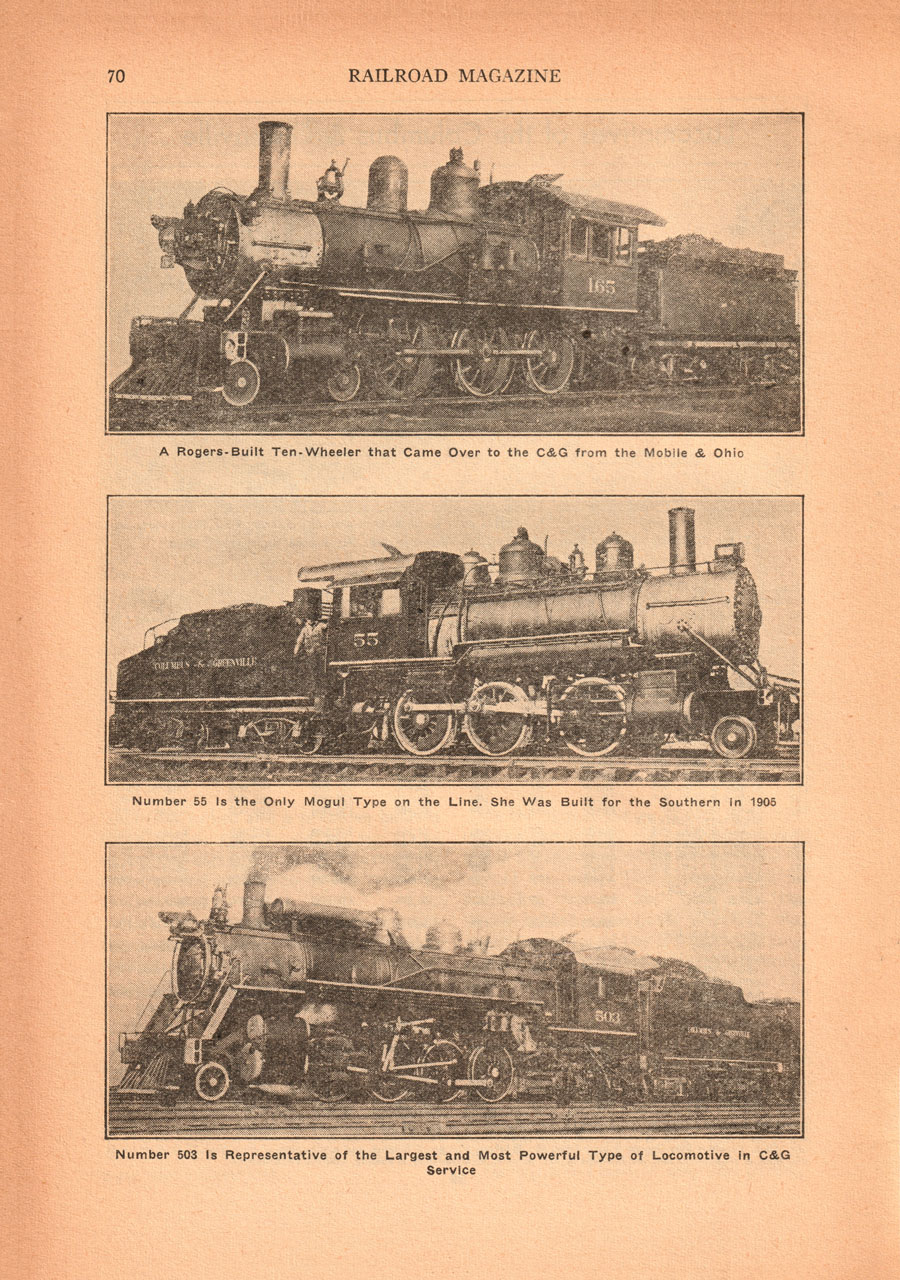
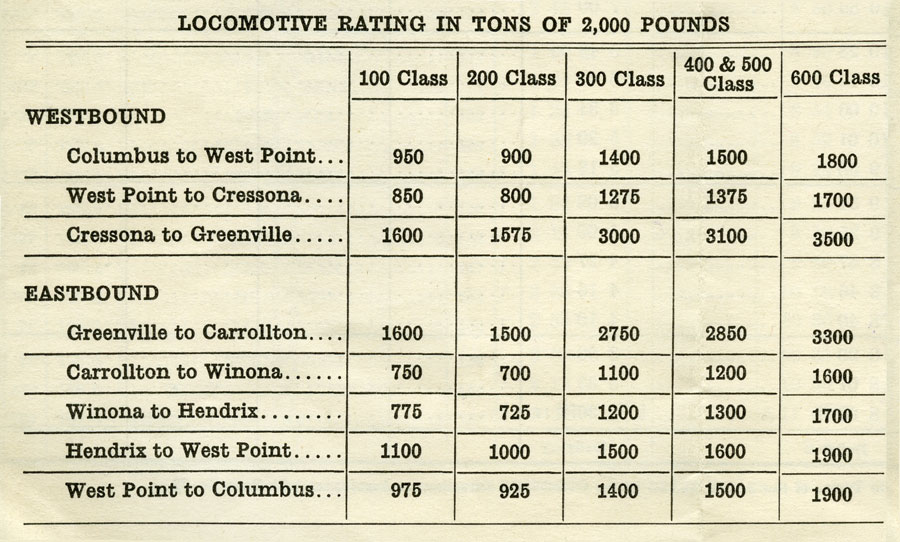
1947 steam locomotive tonnage table / collection
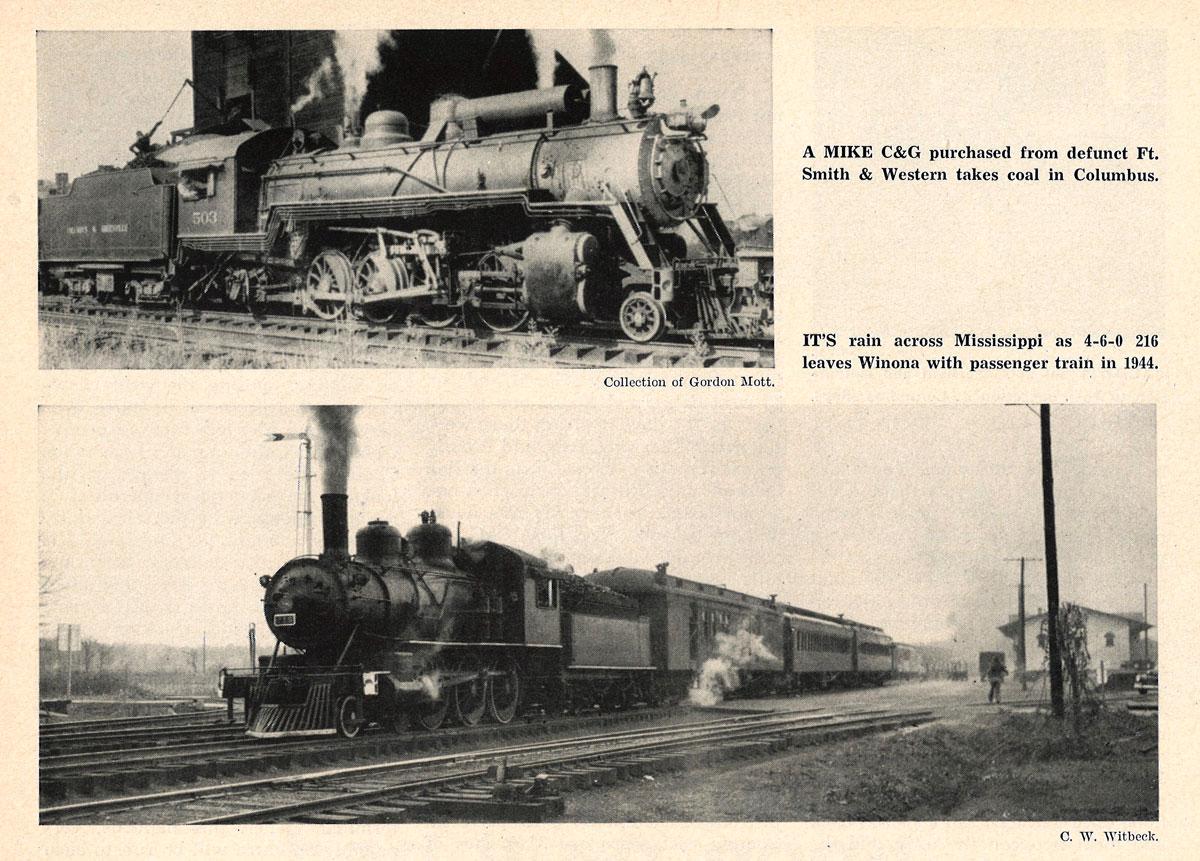
from TRAINS Magazine
- Sep 1958 / collection
Six-coupled
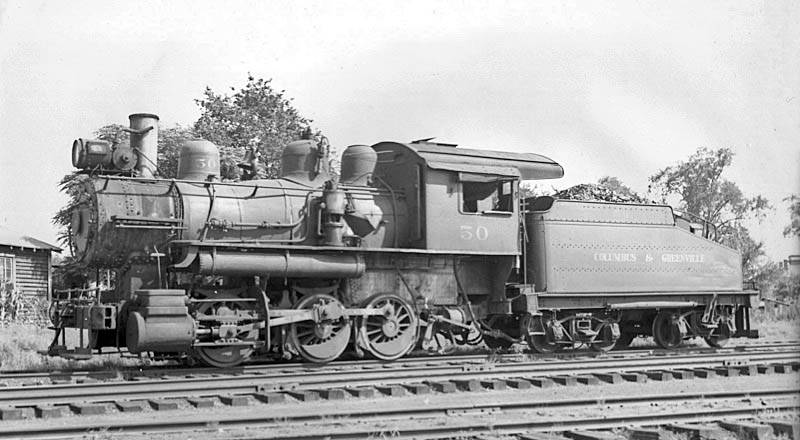
Columbus & Greenville #50
Columbus, Ms / Jul 1937 / collection


Columbus & Greenville #50
to Columbus & Greenville #50, 1923
retired and scrapped 1938
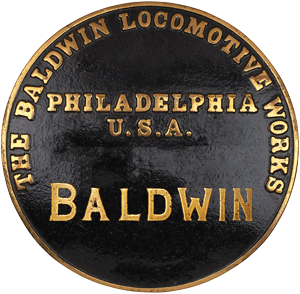
 Columbus & Greenville #50 was the shortline's only steamer built in a switcher configuration, assigned to work Columbus yard until the 1930s when heavier yard power arrived. Built in 1906 and purchased from the Southern Railway in 1923, she was similar in appearance and appliances to Southern #1621 (below) — both engines from Southern's A class of six-coupled yard switchers.
Columbus & Greenville #50 was the shortline's only steamer built in a switcher configuration, assigned to work Columbus yard until the 1930s when heavier yard power arrived. Built in 1906 and purchased from the Southern Railway in 1923, she was similar in appearance and appliances to Southern #1621 (below) — both engines from Southern's A class of six-coupled yard switchers.

JCH
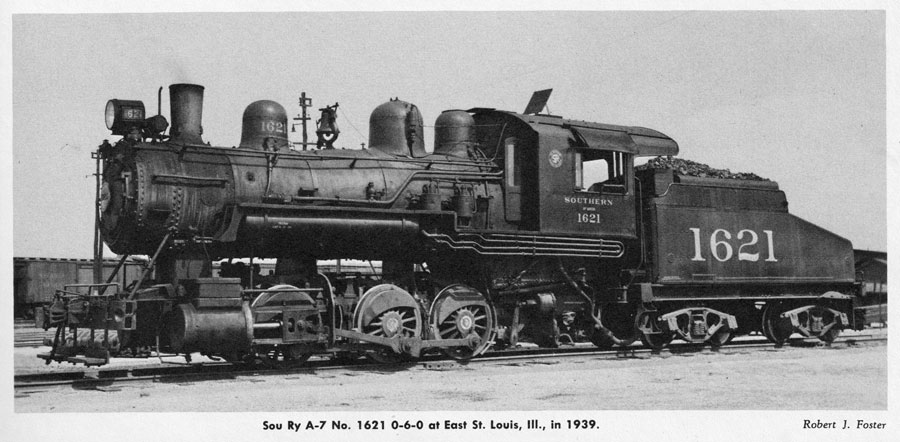
from Southern Railway System: Steam Locomotives
— Richard E. Prince / collection
Mogul
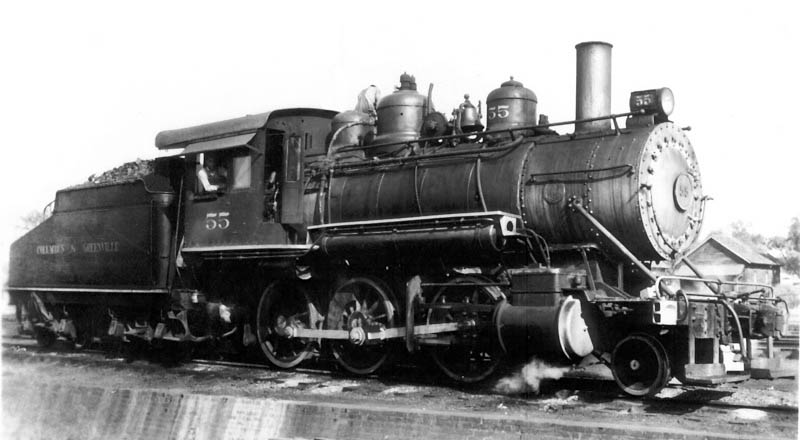
Columbus & Greenville #55
Columbus, Ms / 1940 / collection


Columbus & Greenville #55
to Southern Railway #7081
to Columbus & Greenville #55, 1937
retired 1945

 Columbus & Greenville #55 was one of only two Mogul 2-6-0 types on the roster. Built in 1905 for the New Orleans Terminal Company, it went to the Southern Railway when NOT was acquired by the Southern. It later went to the C&G in 1937, working Columbus in switching duties, but the steamer was retired by 1945. Although #55 shows later Southern modifications and a sloped tender applied in Columbus, she is quite similar in design to sister New Orleans Terminal #110 (below).
Columbus & Greenville #55 was one of only two Mogul 2-6-0 types on the roster. Built in 1905 for the New Orleans Terminal Company, it went to the Southern Railway when NOT was acquired by the Southern. It later went to the C&G in 1937, working Columbus in switching duties, but the steamer was retired by 1945. Although #55 shows later Southern modifications and a sloped tender applied in Columbus, she is quite similar in design to sister New Orleans Terminal #110 (below).
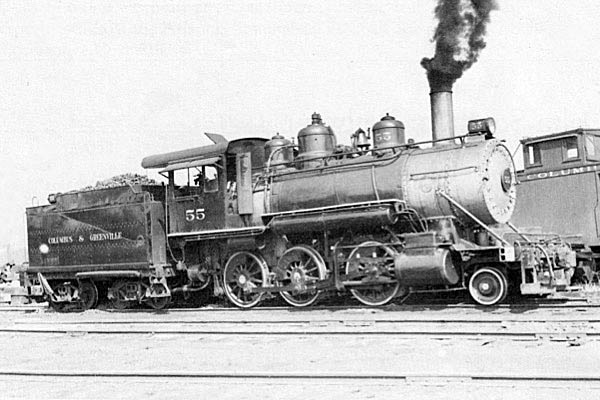
Columbus, Ms / Jul 1937 / collection
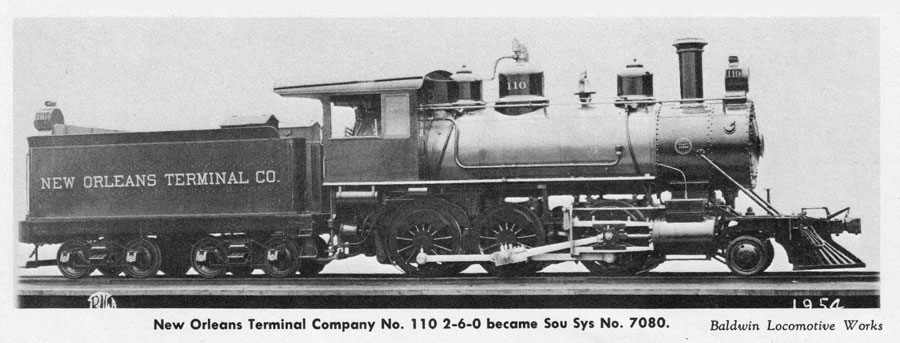
from Southern Railway System: Steam Locomotives
— Richard E. Prince / collection
Ten-wheelers
 The backbone of the Columbus & Greenville steam roster was the nimble Ten-wheeler arrangement. The Delta Route would collect no less than 4 classes of the 4-6-0 type, some 34 locomotives in all. Three of these classes were hand-me-down locomotives from nearby Mobile & Ohio. The first two batches were built in the last years of the 19th century, by Rogers Locomotive & Machine Works. Classes 100 (17 steamers) and 200 (6 steamers) came to Columbus in the fall of 1923, mechanically similar except for diver size. Class 300 (5 steamers) were Baldwins built in 1904, also secondhand from the M&O, arriving in stages in the early 1930s. Class 400 is described below.
The backbone of the Columbus & Greenville steam roster was the nimble Ten-wheeler arrangement. The Delta Route would collect no less than 4 classes of the 4-6-0 type, some 34 locomotives in all. Three of these classes were hand-me-down locomotives from nearby Mobile & Ohio. The first two batches were built in the last years of the 19th century, by Rogers Locomotive & Machine Works. Classes 100 (17 steamers) and 200 (6 steamers) came to Columbus in the fall of 1923, mechanically similar except for diver size. Class 300 (5 steamers) were Baldwins built in 1904, also secondhand from the M&O, arriving in stages in the early 1930s. Class 400 is described below.
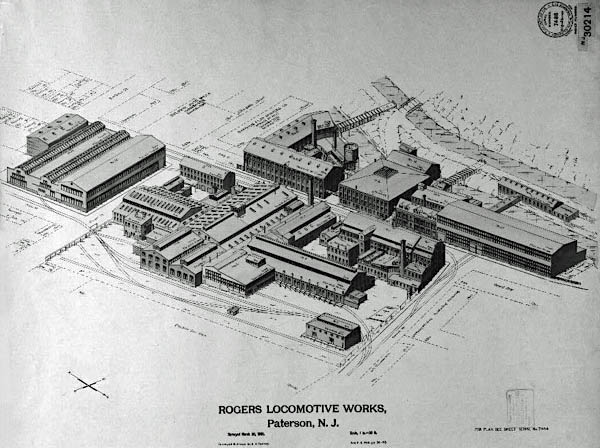 Rogers Locomotive and Machine Works was a 19th-century manufacturer of railroad steam locomotives based in Paterson, in Passaic County, New Jersey, in the United States. It built more than six thousand steam locomotives for railroads around the world. Most railroads in 19th-century United States rostered at least one Rogers-built locomotive. The company's most famous product was a locomotive named The General, built in December 1855, which was one of the principals of the Great Locomotive Chase of the American Civil War.
Rogers Locomotive and Machine Works was a 19th-century manufacturer of railroad steam locomotives based in Paterson, in Passaic County, New Jersey, in the United States. It built more than six thousand steam locomotives for railroads around the world. Most railroads in 19th-century United States rostered at least one Rogers-built locomotive. The company's most famous product was a locomotive named The General, built in December 1855, which was one of the principals of the Great Locomotive Chase of the American Civil War.
The company was founded by Thomas Rogers in an 1832 partnership with Morris Ketchum and Jasper Grosvenor as Rogers, Ketchum and Grosvenor. Rogers remained president until his death in 1856 when his son, Jacob S. Rogers, took the position and reorganized the company as Rogers Locomotive and Machine Works. The younger Rogers led the company until he retired in 1893. Robert S. Hughes then became president and reorganized the company as Rogers Locomotive Company, which he led until his death in 1900.
Rogers avoided the American Locomotive Company (ALCO) merger in 1901 through closing and reopening as Rogers Locomotive Works. The company remained independent until 1905, when ALCO purchased it; ALCO continued building new steam locomotives at the Rogers plant until 1913. ALCO used the Rogers facilities through the 1920s as a parts storage facility and warehouse, but eventually sold the property to private investors. Today, several Rogers-built locomotives exist in railroad museums around the world, and the plant's erecting shop is preserved as the Thomas Rogers Building; it is the current location of the Paterson Museum, whose mission is to preserve and display Paterson's industrial history.
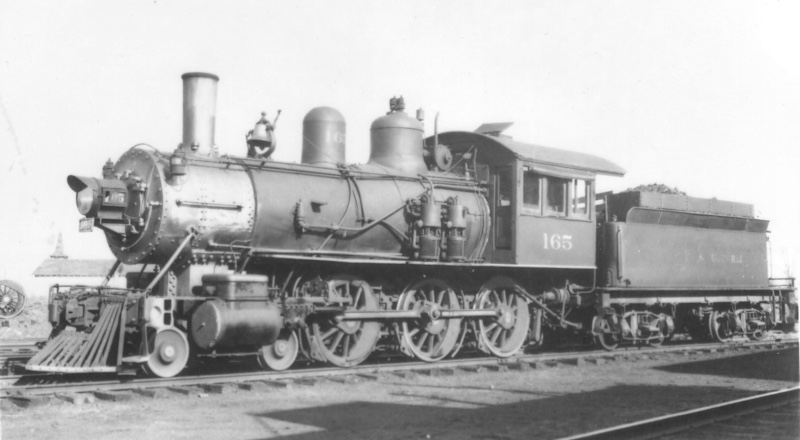
Columbus & Greenville #165
Columbus, Ms / collection


Columbus & Greenville #165
to Mobile & Ohio #131
to Columbus & Greenville #165, 1923
retired 1940
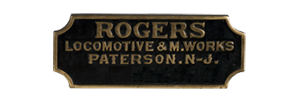
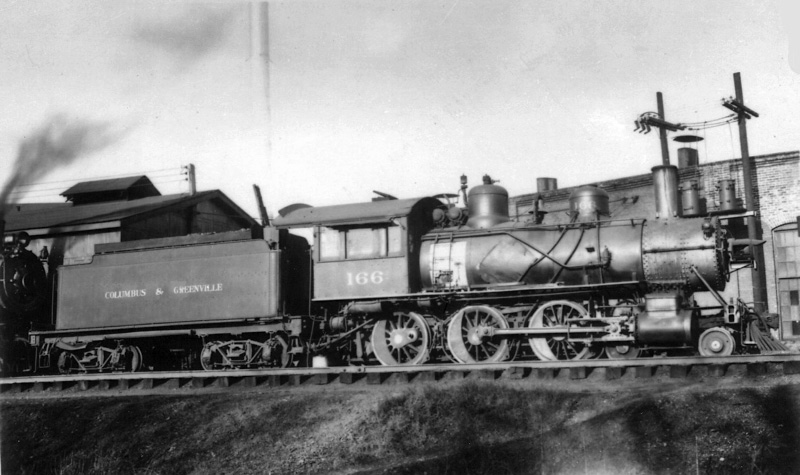
Columbus & Greenville #166
Columbus, Ms / collection


Columbus & Greenville #166
to Mobile & Ohio #134
to Columbus & Greenville #166, 1923
scrapped 1947

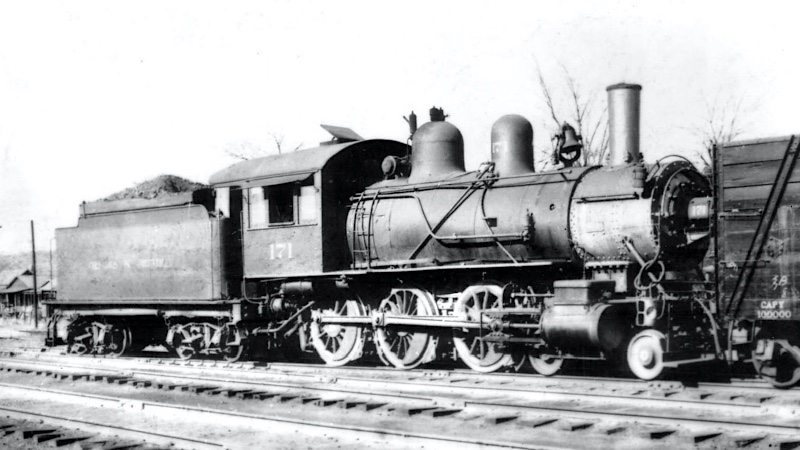
Columbus & Greenville #171
Columbus, Ms / collection


Columbus & Greenville #171
to Columbus & Greenville #171, 1923
scrapped 1946

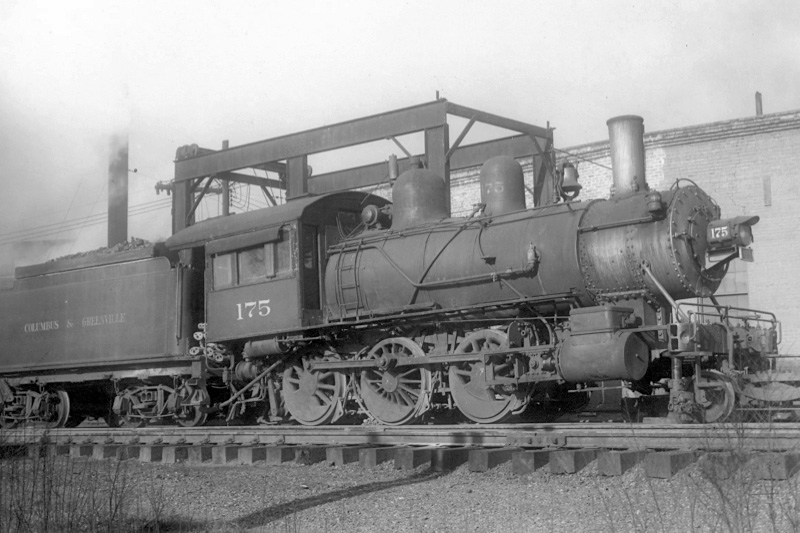
Columbus & Greenville #175
Columbus, Ms / collection


Columbus & Greenville #175
to Columbus & Greenville #175, 1923
scrapped 1946

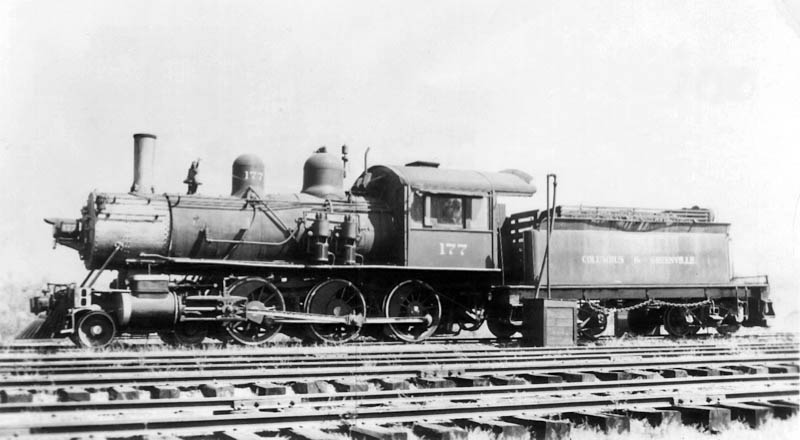
Columbus & Greenville #177
Durant, Ms / 1940 / collection


Columbus & Greenville #177
to Columbus & Greenville #177, 1923
sold to Columbus Gravel Co, 1948

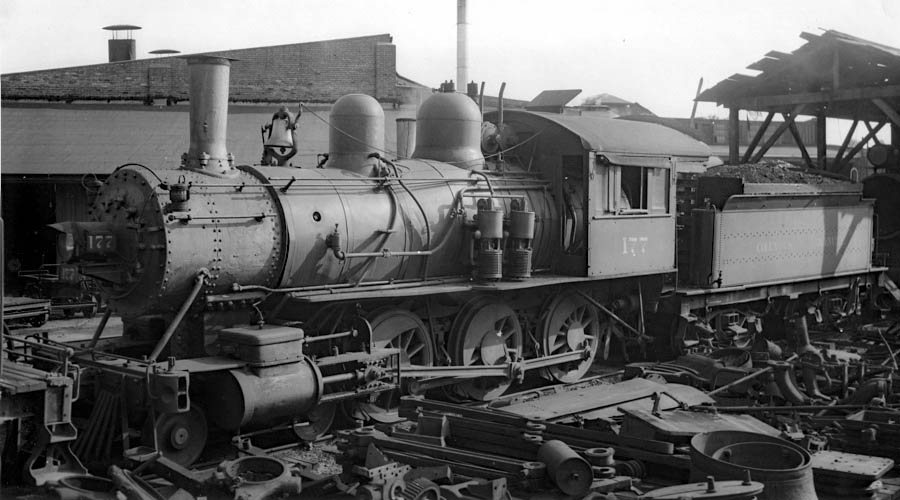
Columbus, Ms / 1937 / collection
 Rogers Survivor
Rogers Survivor
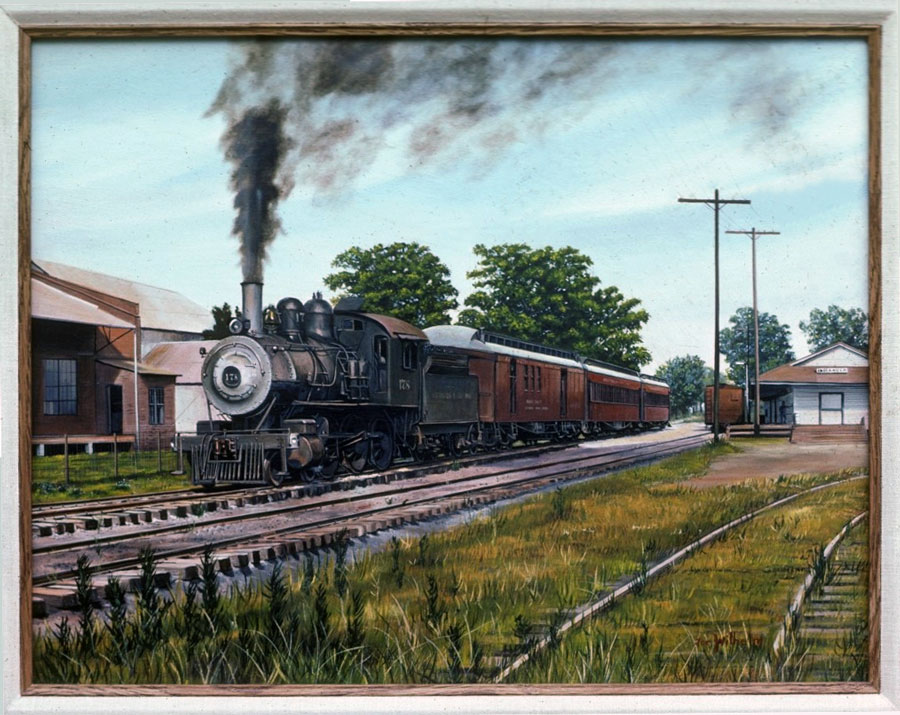
JCH
The image above is a photograph of an oil painting by Joseph Wilhelm created for the publication of Louis Saillard's written history of the Columbus & Greenville (right), which was published for the centennial of the railroad in 1982. The painting features Rogers-built steamer #178 leaving the depot at Indianola, Mississippi, with an eastbound Deltan passenger train in tow. Perhaps because it was the last steam locomotive overhauled by the Columbus shops, No. 178 was not scrapped after retirement in 1951 but instead was stored outside the shops for many years. Eventually a federal grant was used to place the steamer and a similar train to the one in the painting on display at Propst Park in Columbus. No. 178 is one of the one few surviving products of the Rogers Locomotive Works.
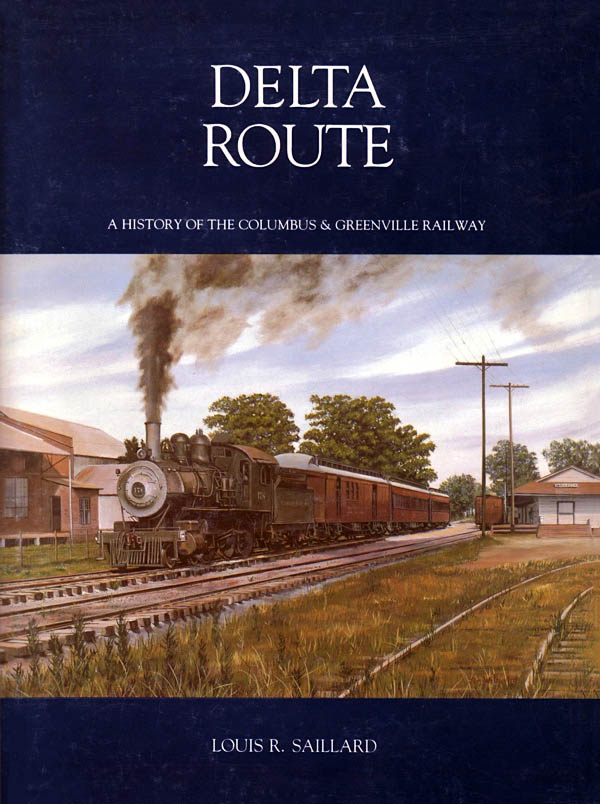

 UNCOMMON or UNUSUAL locomotive
UNCOMMON or UNUSUAL locomotive
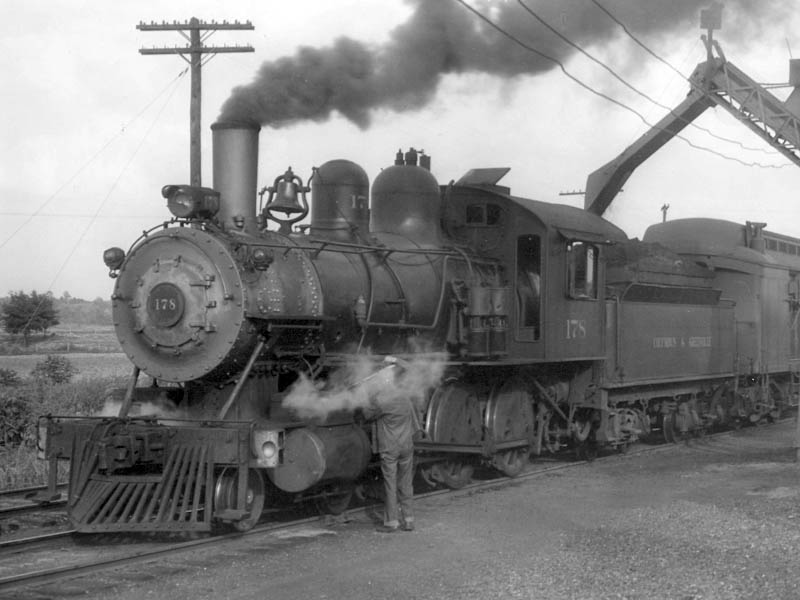
Columbus & Greenville #178
Winona, Ms / 1940 / collection


Columbus & Greenville #178
to Mobile & Ohio #178
to Columbus & Greenville #178, 1923
rebuilt by Columbus shops, 1948
retired 1951
on display in Propst Park, Columbus

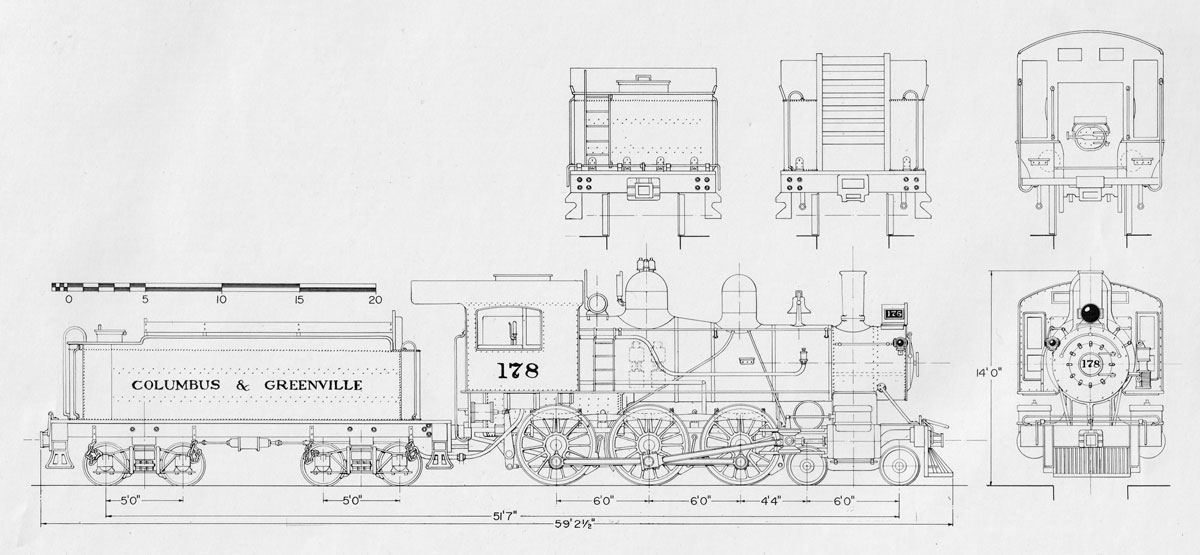
drawing by Ed Gebhardt / collection
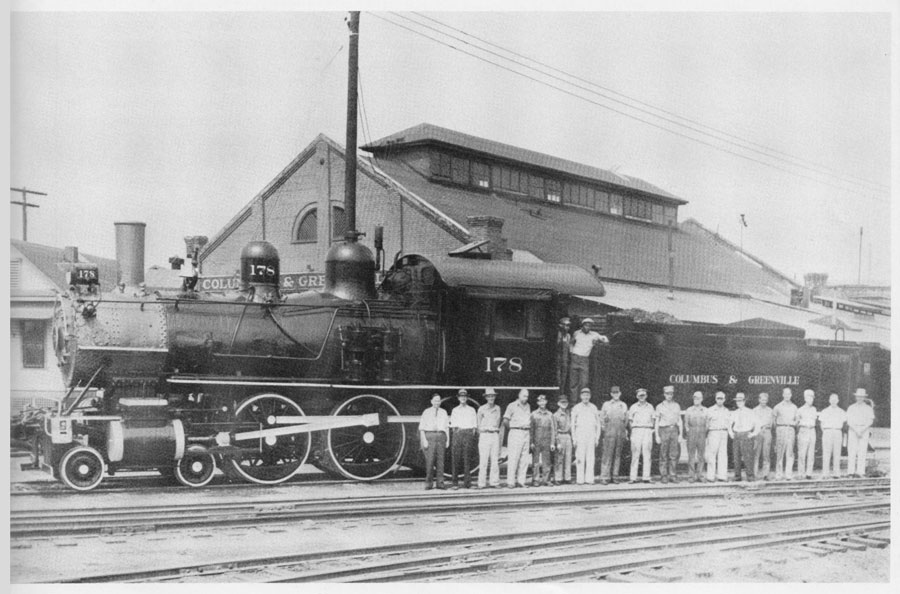
1948 rebuild / from Delta Route: A History of the Columbus & Greenville — Louis Saillard / collection
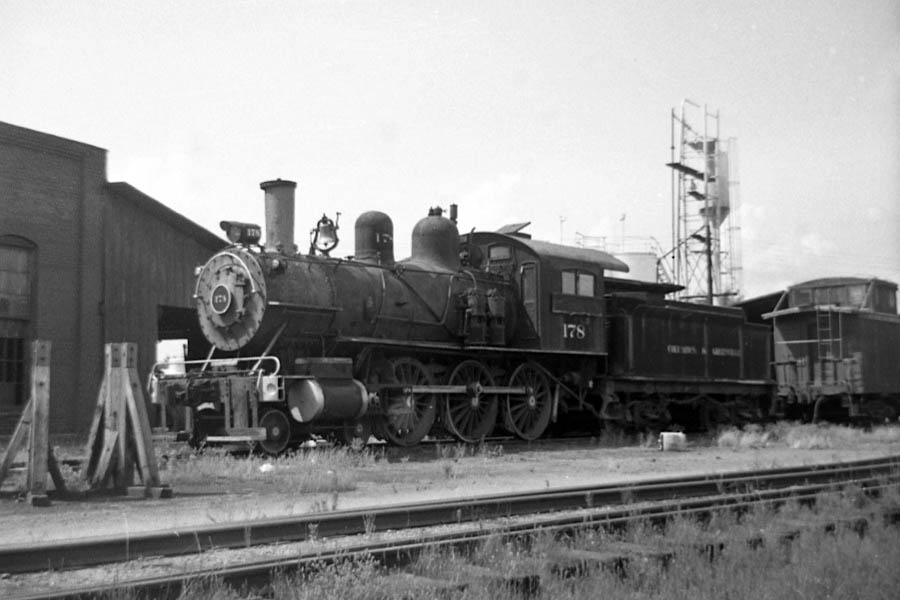
Columbus, Ms / Jun 1957 / JCH
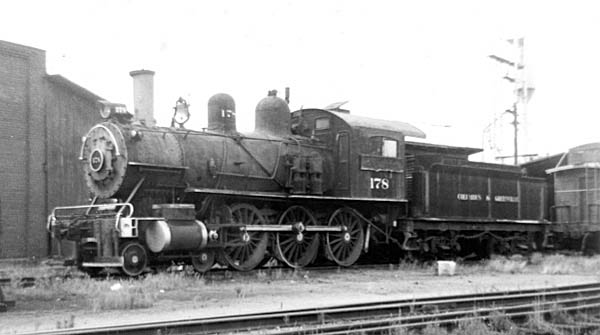
Columbus, Ms / Jun 1957 / JCH
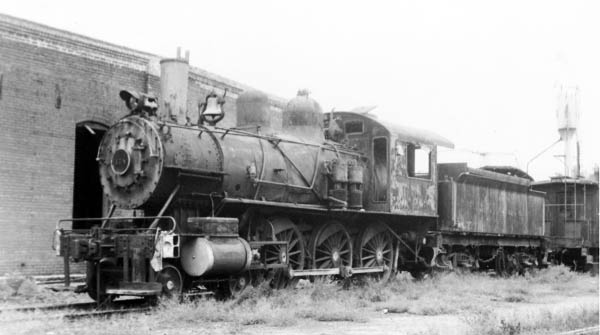
Columbus, Ms / Dec 1967 / JCH
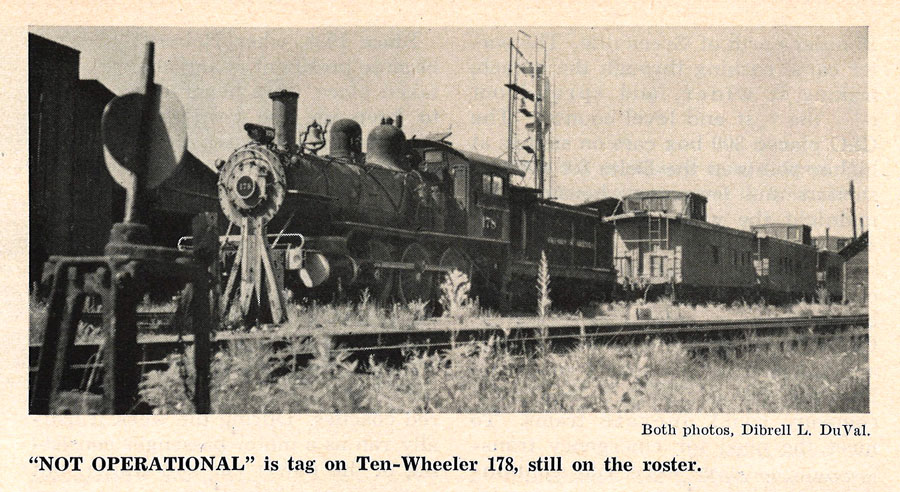
from TRAINS Magazine
- Sep 1958 / collection

My first visit to the Columbus & Greenville was in 1957. I took a few pictures of 4-6-0 #178 as it looked pretty good, even though the main rods were off. The thing that always struck me about the C&G was that they never got rid of anything! In 1957 there were five or six passenger cars in the Columbus yard, even though passenger service had been dropped in 1946.
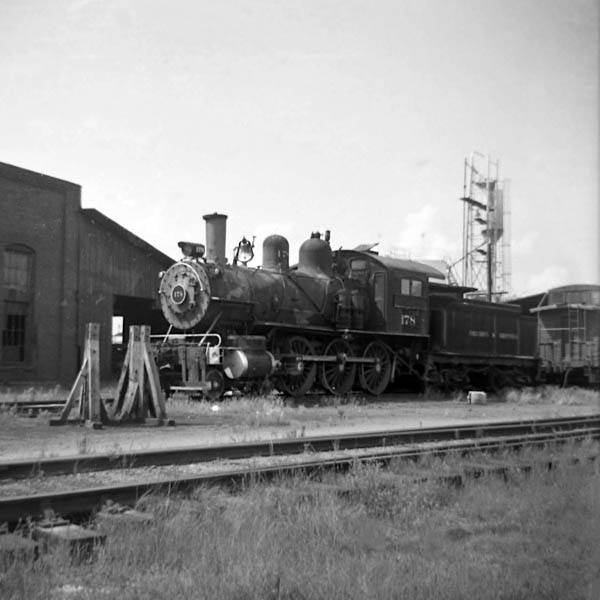
Columbus, Ms / Jun 1957 / JCH
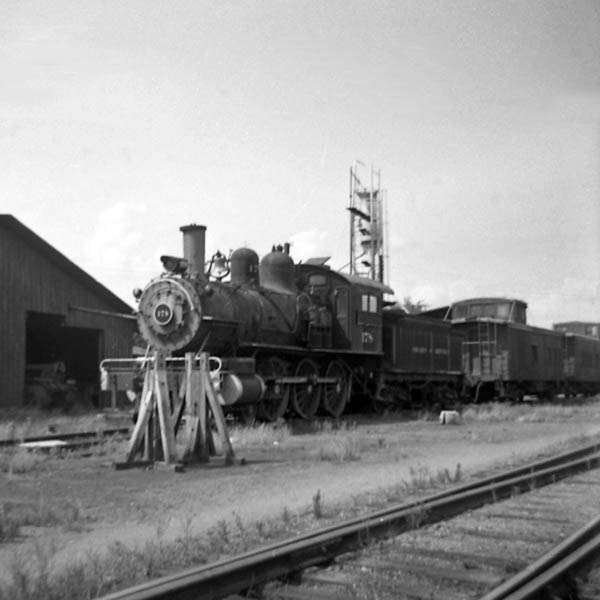
Columbus, Ms / Jun 1957 / JCH
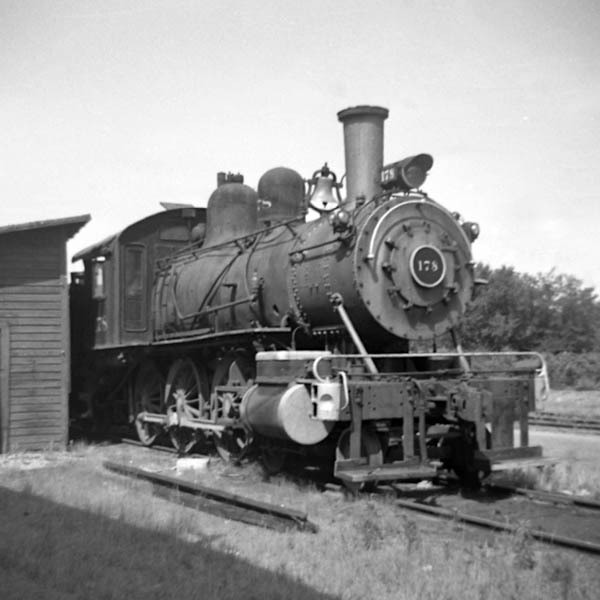
Columbus, Ms / Jun 1957 / JCH
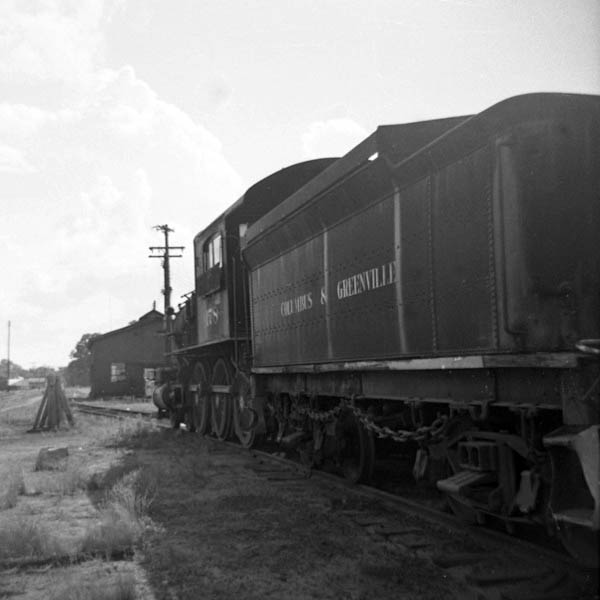
Columbus, Ms / Jun 1957 / JCH
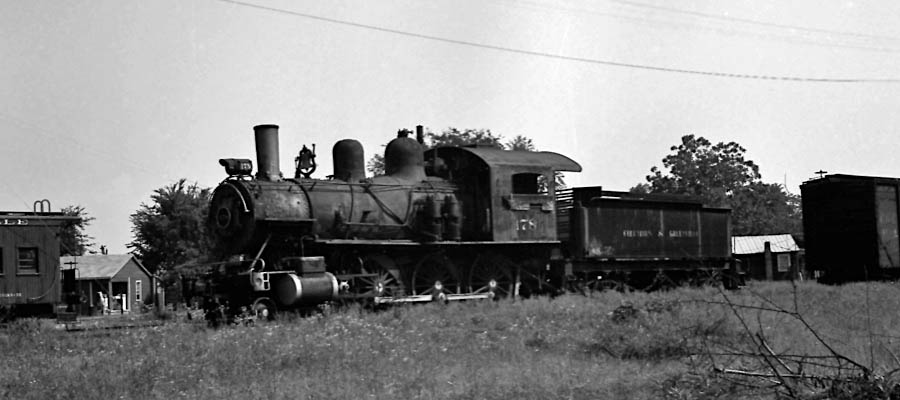
Columbus, Ms / May 1960 / JCH
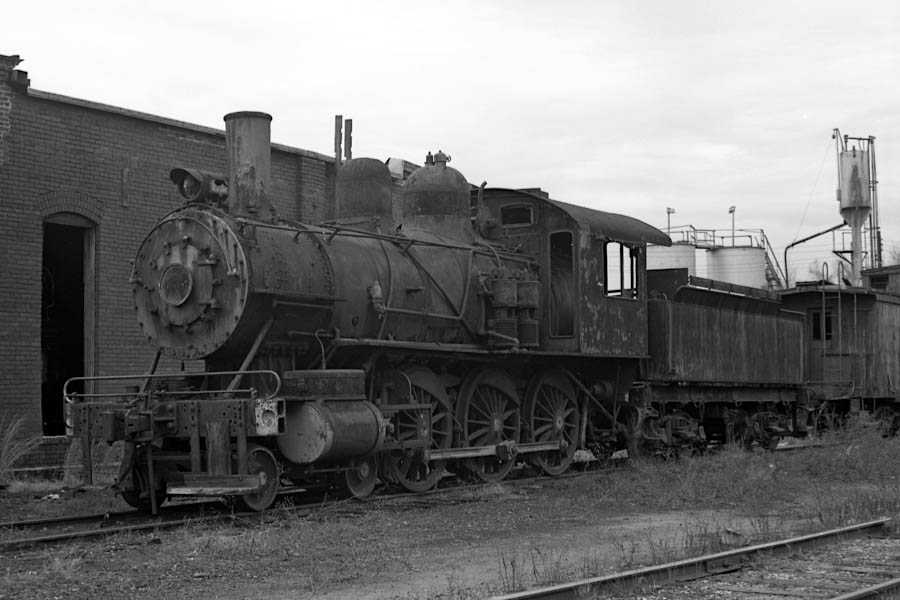
Columbus, Ms / Nov 1971 / collection
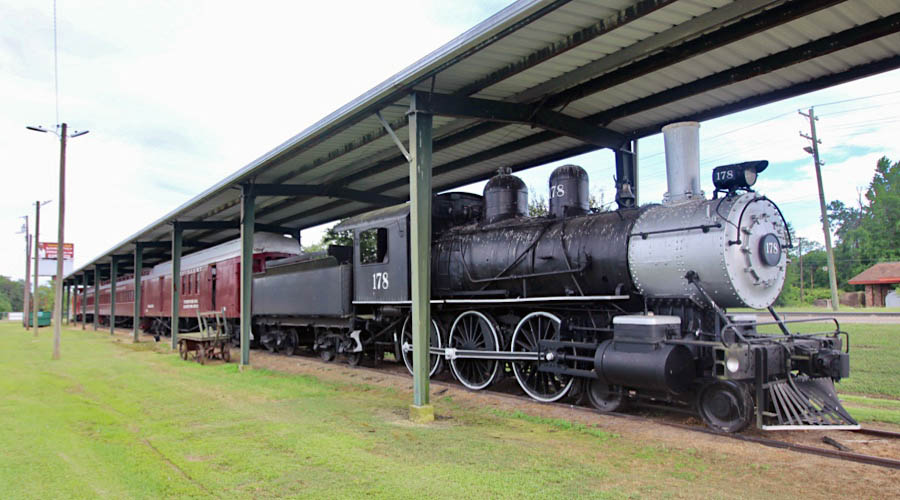
Columbus, Ms / Jun 2020 / RWH

See also our Propst Park scrapbook for detailed photographs of #178 on display
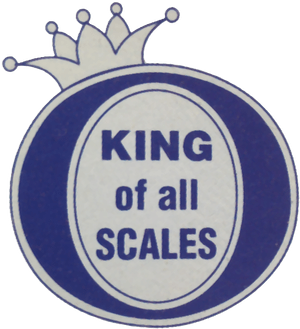
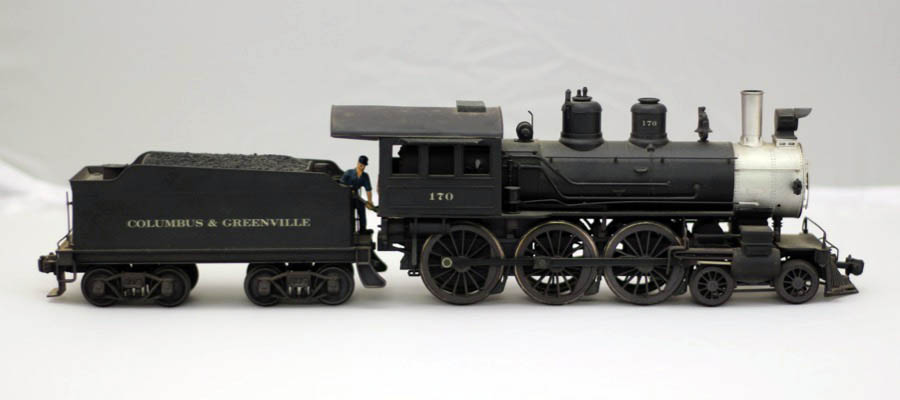
Columbus & Greenville #170
O scale locomotive / JCH model
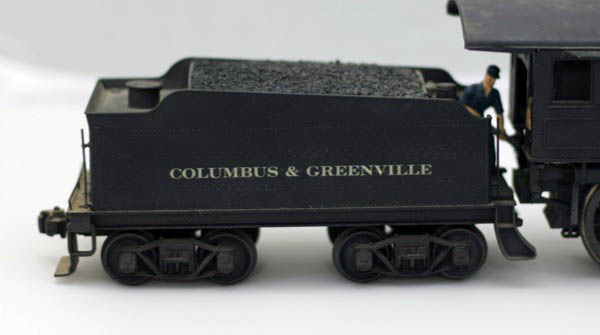
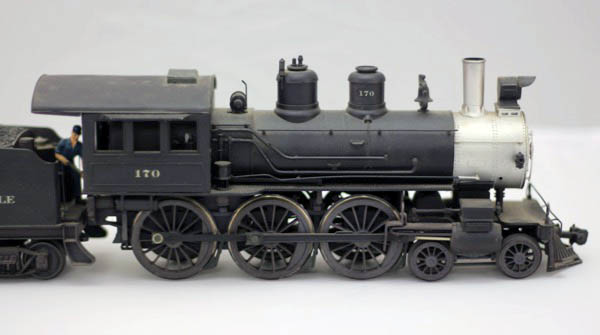
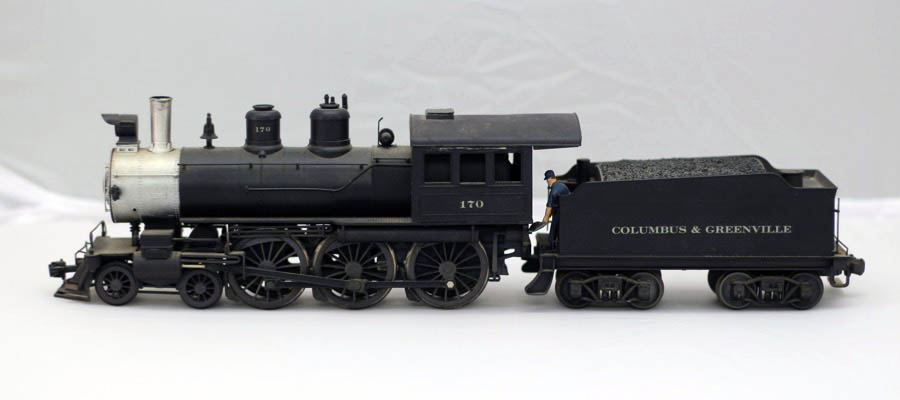

See also our Columbus & Greenville O Scale Modeling scrapbook
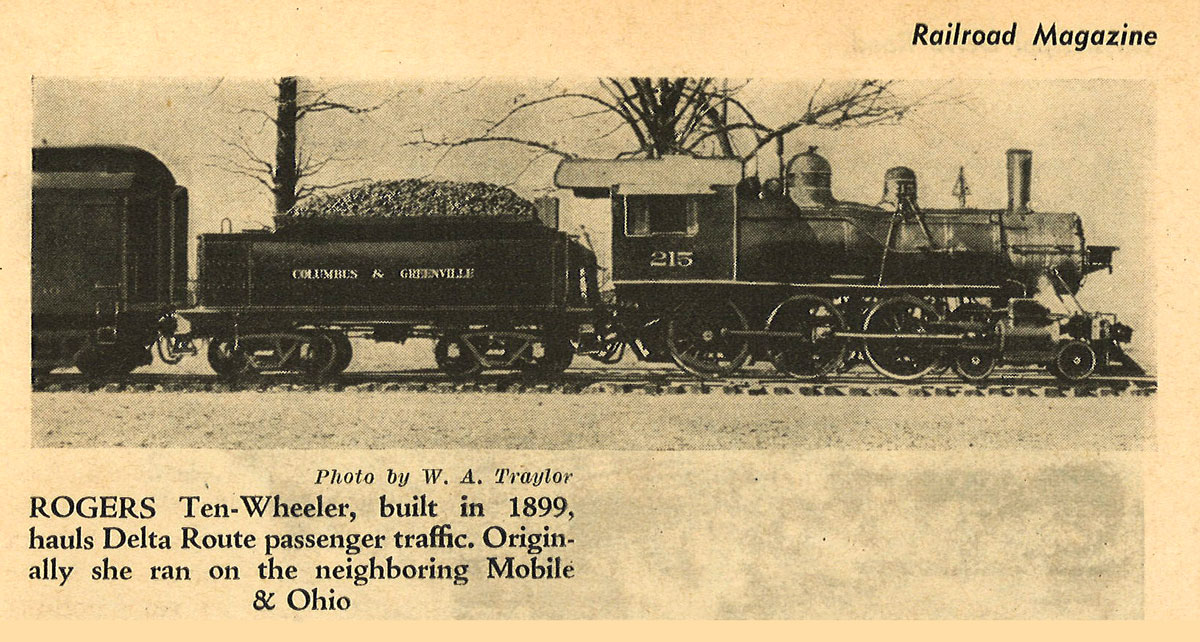
from Railroad Magazine
- Aug 1944 / collection
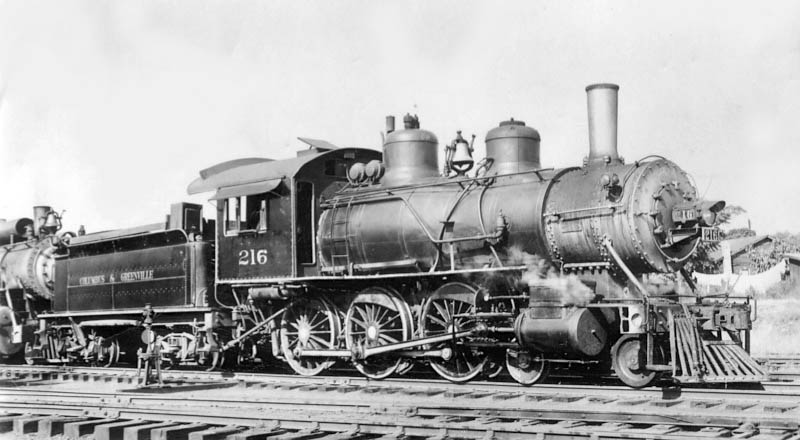
Columbus, Ms / collection


Columbus & Greenville #216
to Mobile & Ohio #216
to Columbus & Greenville #216, 1923
rebuilt by Columbus shops, 1939
scrapped 1946

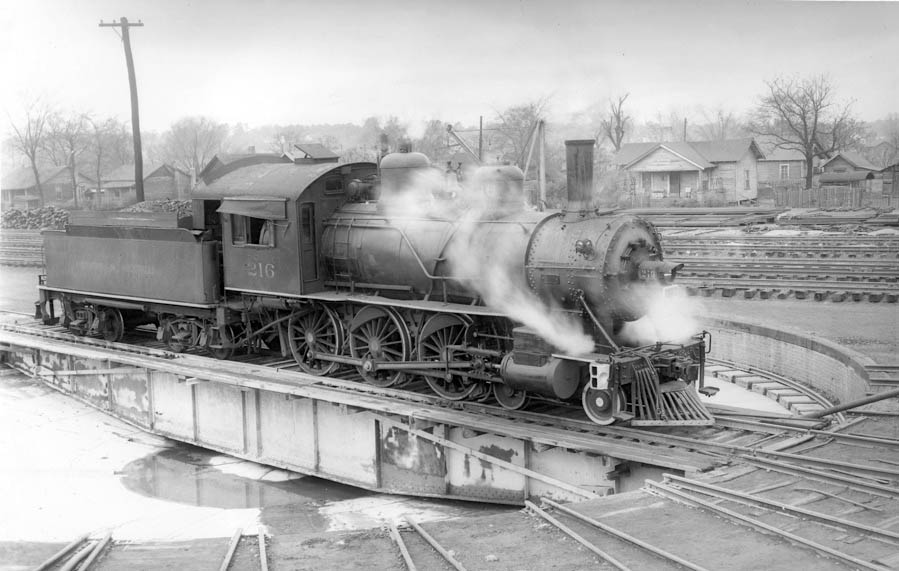
Columbus, Ms / 1944 / C. W. Witbeck / collection
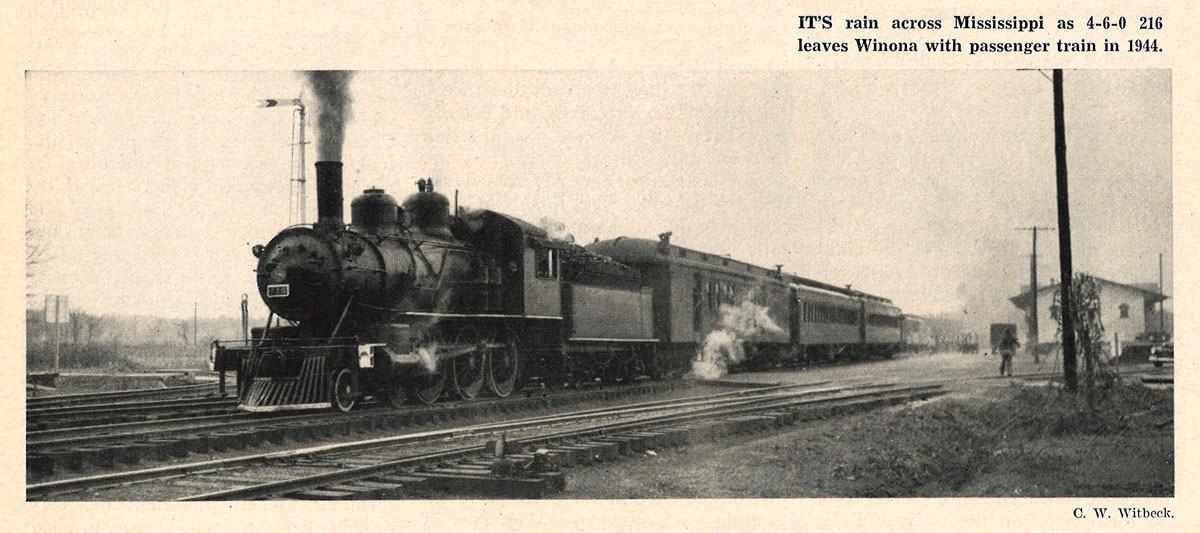
from TRAINS Magazine
- Sep 1958 / collection
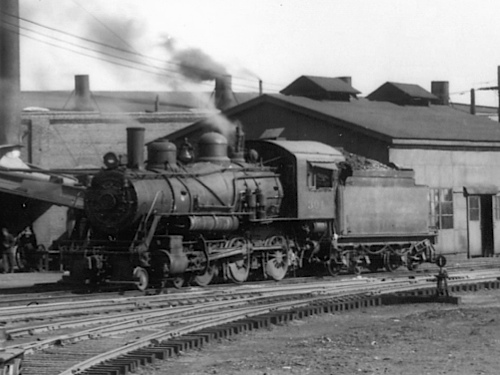
Columbus & Greenville #301
Columbus, Ms / Mar 1944 / collection


Columbus & Greenville #301
to Mobile & Ohio #315
to Columbus & Greenville #301, 1930
scrapped 1939

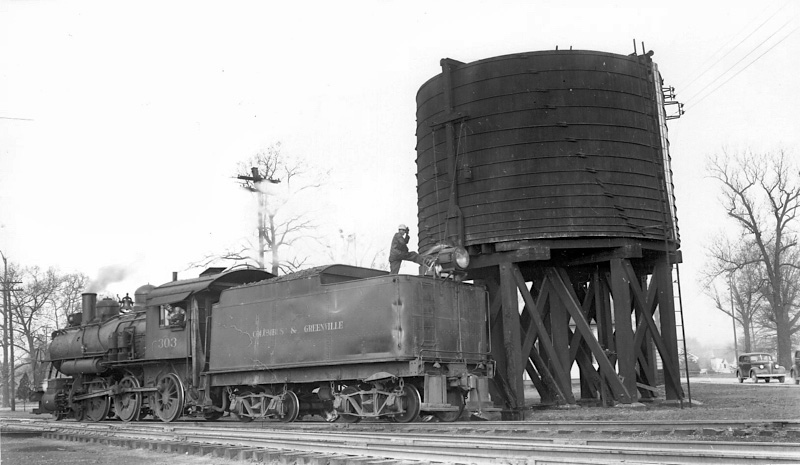
Columbus & Greenville #303
Columbus, Ms / 1944 / collection


Columbus & Greenville #303
to Mobile & Ohio #319
to Columbus & Greenville #303, 1930
scrapped 1948

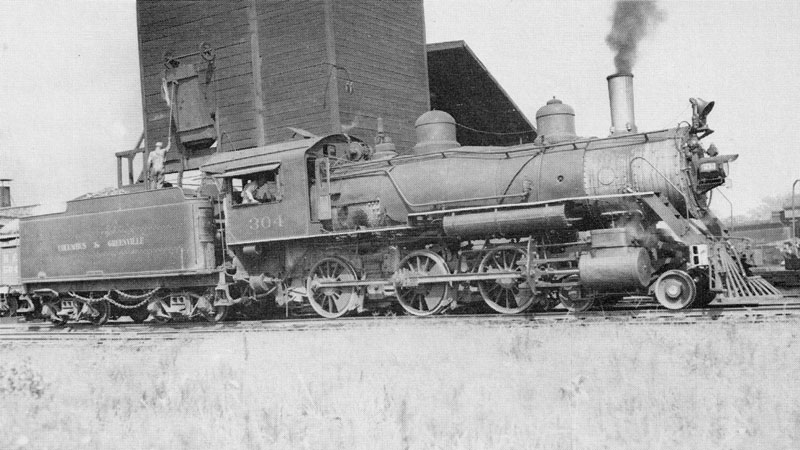
Columbus & Greenville #304
Columbus, Ms / Jul 1937 / collection


Columbus & Greenville #304
to Mobile & Ohio #313
to Columbus & Greenville #304, 1934
scrapped 1952

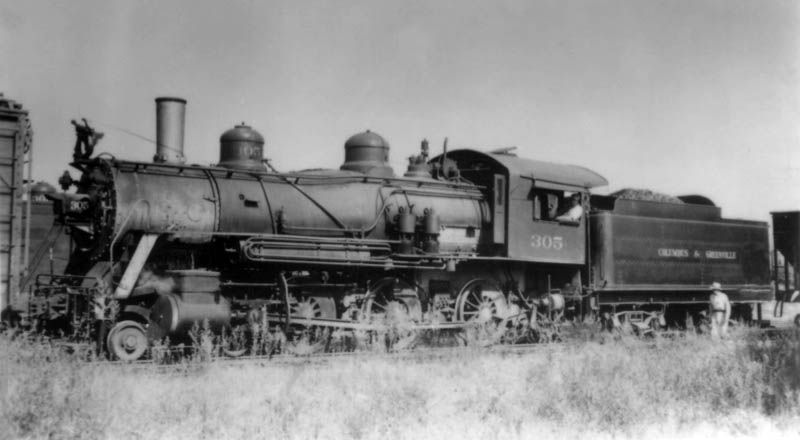
Columbus & Greenville #305
collection


Columbus & Greenville #305
to Mobile & Ohio #312
to Columbus & Greenville #305, 1934
scrapped 1947

 Columbus & Greenville's 400 class of steamers, Nos. 401-406, were purchased from dealer Georgia Car & Locomotive Company during 1937-38. These 6 Baldwins were all built in 1906-07 for the Atlanta, Birmingham & Atlantic. Baldwin builders photos below show C&G #401 as built as #1609, with sister AB&A #1602 below. Although these locomotives were more powerful than all previous Delta Route steam, they rode poorly and were generally disliked by the engine crews.
Columbus & Greenville's 400 class of steamers, Nos. 401-406, were purchased from dealer Georgia Car & Locomotive Company during 1937-38. These 6 Baldwins were all built in 1906-07 for the Atlanta, Birmingham & Atlantic. Baldwin builders photos below show C&G #401 as built as #1609, with sister AB&A #1602 below. Although these locomotives were more powerful than all previous Delta Route steam, they rode poorly and were generally disliked by the engine crews.
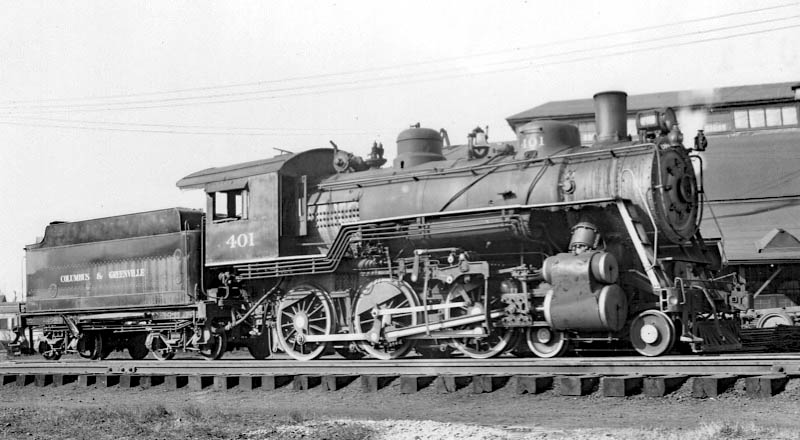
Columbus & Greenville #401
Columbus, Ms / collection


Columbus & Greenville #401
to Atlanta, Birmingham & Coast #109
to Georgia Car & Locomotive dealer
to Columbus & Greenville #401, 1938
scrapped 1947

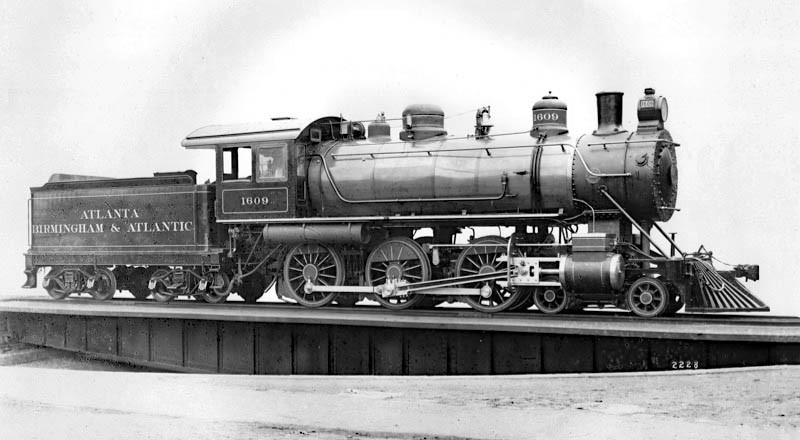
Atlanta, Birmingham & Atlantic #1609
Baldwin builders photo / 1906 / collection
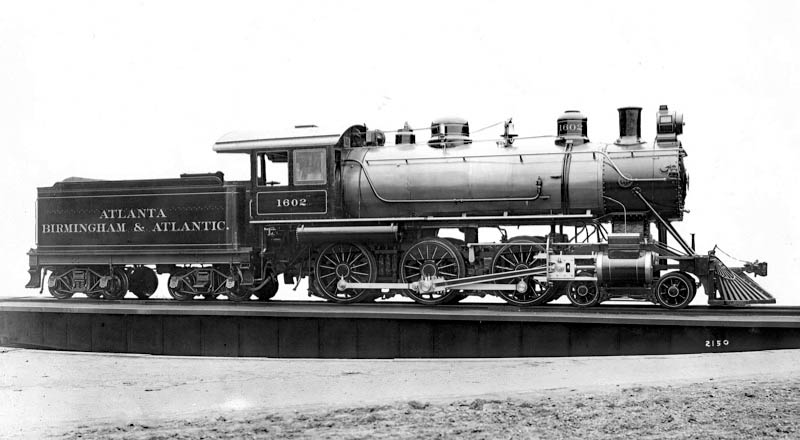
Atlanta, Birmingham & Atlantic #1602
Baldwin builders photo / 1906 / collection
Mikados
 Columbus & Greenville saved the best for last with its 500 class of steamers. These 6 Baldwin 'Mikado' type haulers were purchased second hand from the Fort Smith & Western in Arkansas when that shortline went bankrupt. Built between 1916-20, the Mikes were generally considered the best steam engines the Delta Route owned. They sported 57" drivers, nimble tenders, spoked wheels, and unusual mounting of the air tanks on top of the boiler behind the smokestack. Fort Smith & Western #28, to become C&G #505 (not pictured), is shown here in a Baldwin builders photo.
Columbus & Greenville saved the best for last with its 500 class of steamers. These 6 Baldwin 'Mikado' type haulers were purchased second hand from the Fort Smith & Western in Arkansas when that shortline went bankrupt. Built between 1916-20, the Mikes were generally considered the best steam engines the Delta Route owned. They sported 57" drivers, nimble tenders, spoked wheels, and unusual mounting of the air tanks on top of the boiler behind the smokestack. Fort Smith & Western #28, to become C&G #505 (not pictured), is shown here in a Baldwin builders photo.
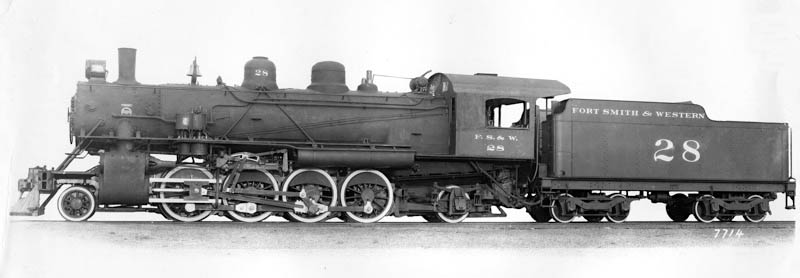
Fort Smith & Western #28
Baldwin builders photo / 1920 / collection
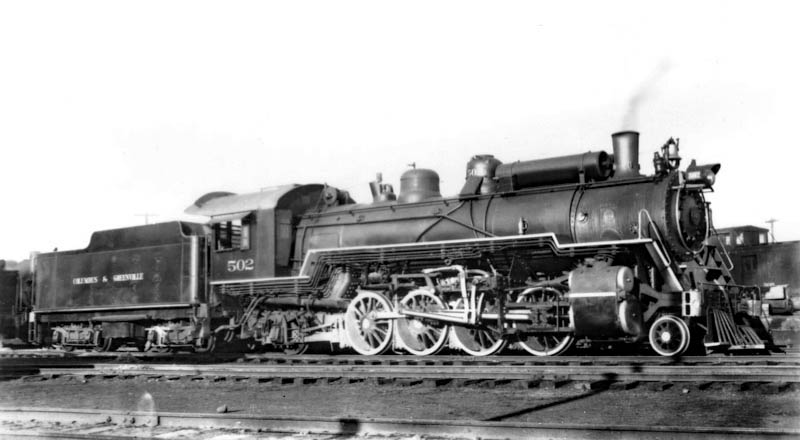
Columbus & Greenville #502
Columbus, Ms / collection


Columbus & Greenville #502
to Columbus & Greenville #502, 1939
scrapped 1947

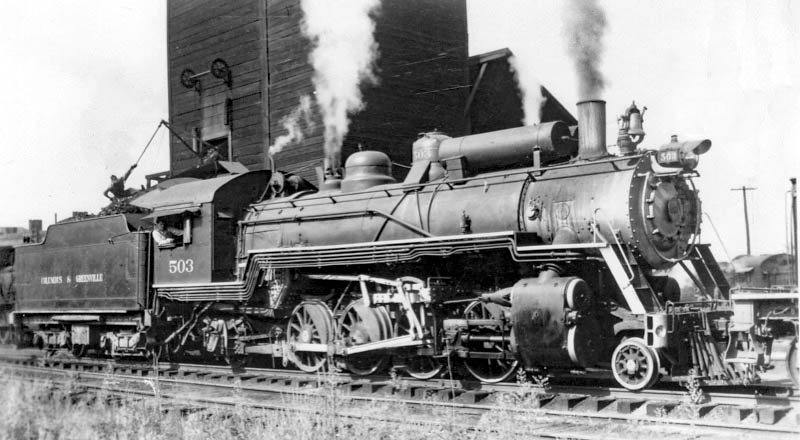
Columbus & Greenville #503
Columbus, Ms / 1940 / collection


Columbus & Greenville #503
to Columbus & Greenville #503, 1939
scrapped 1950

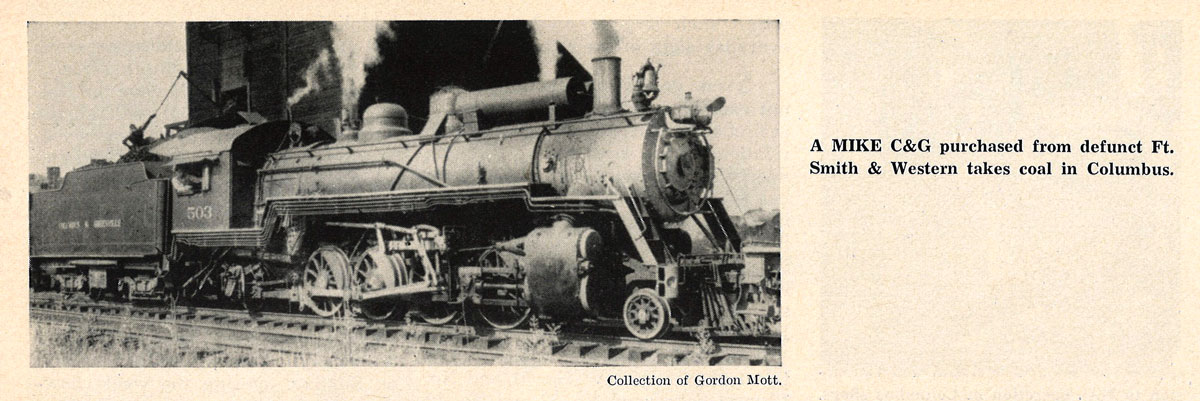
from TRAINS Magazine
- Sep 1958 / collection
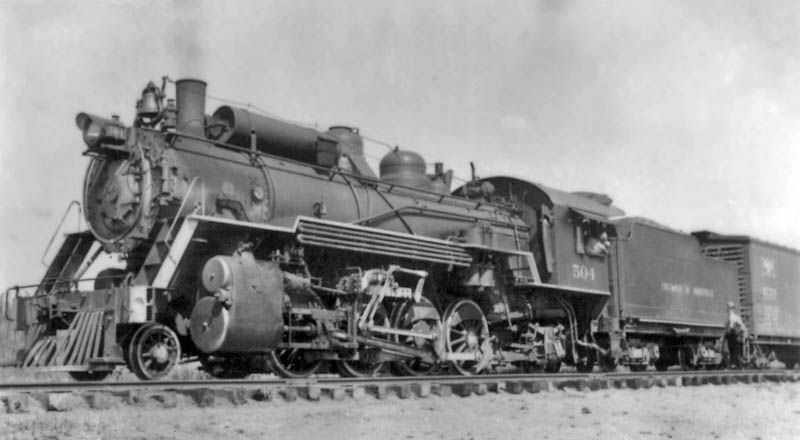
Columbus & Greenville #504
Stewart, Ms / 1940 / collection


Columbus & Greenville #504
to Columbus & Greenville #504, 1939
scrapped 1947

 Scrapbook
Scrapbook
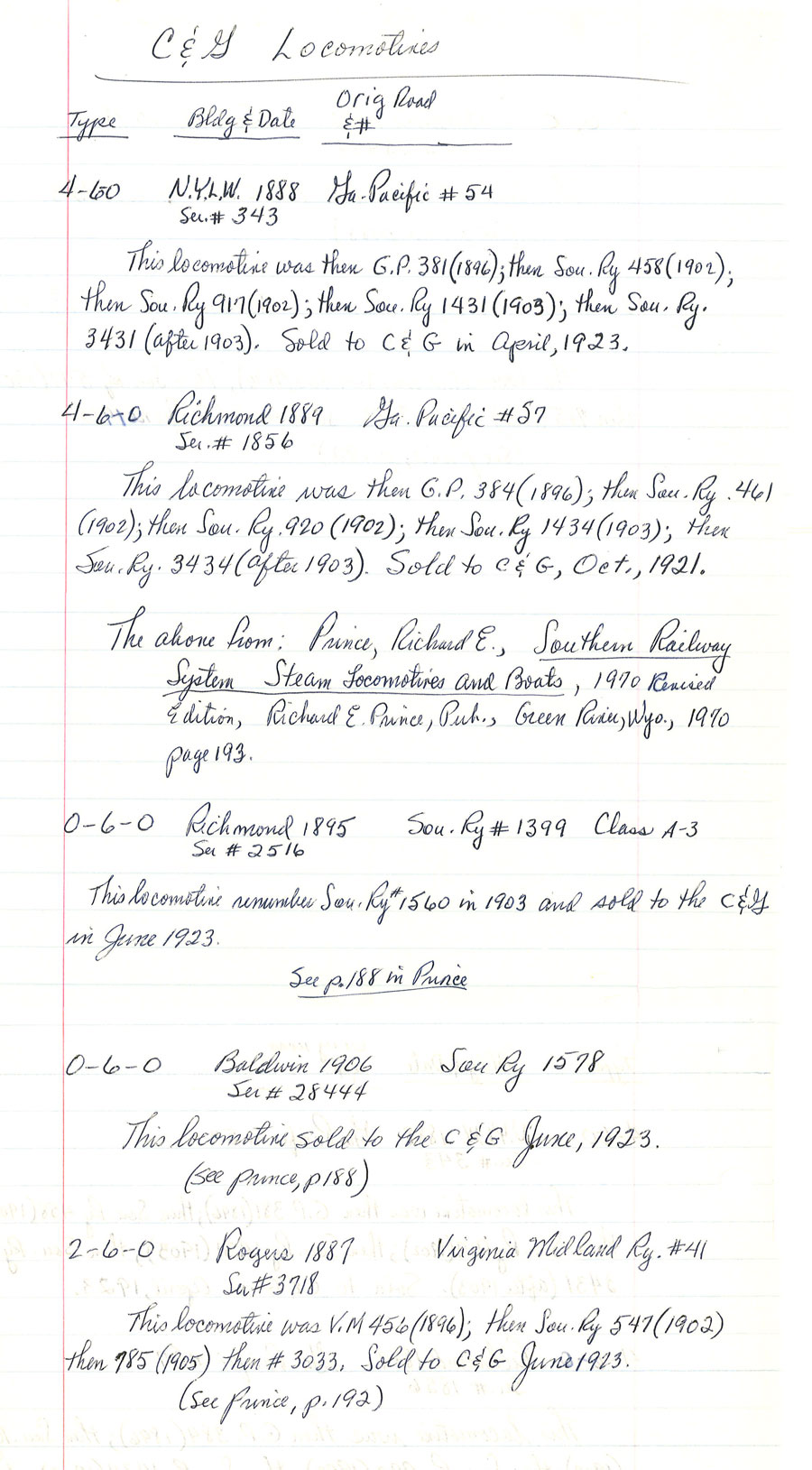
notes on early Columbus & Greenville steamers / JCH
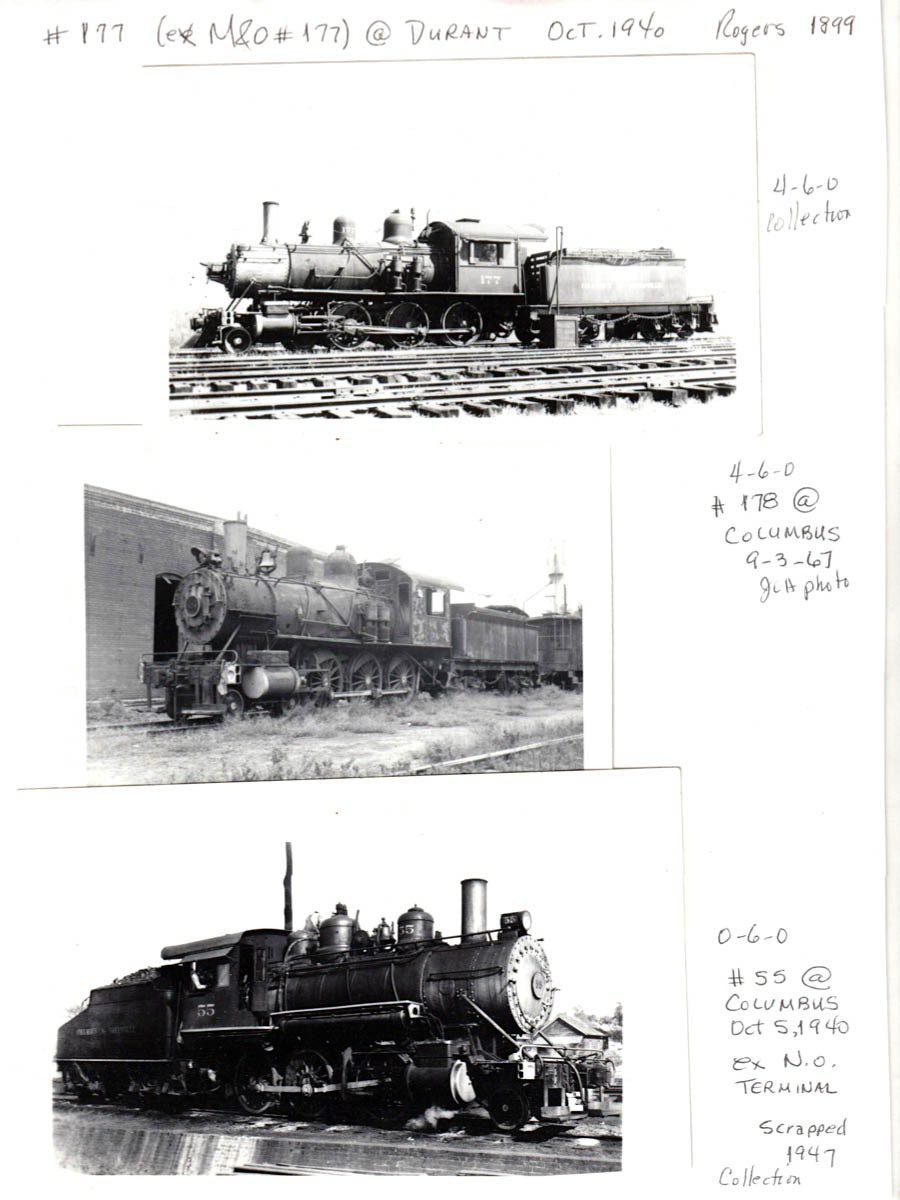
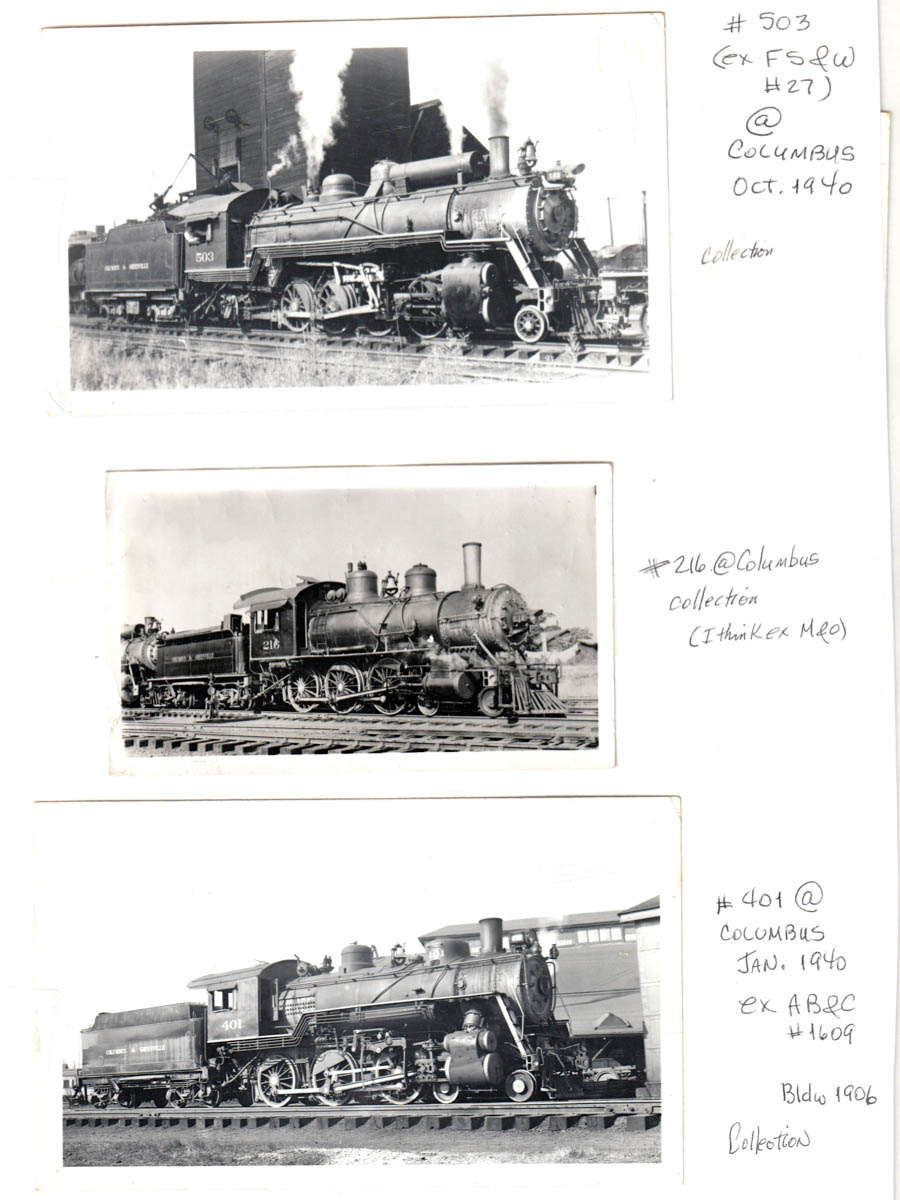
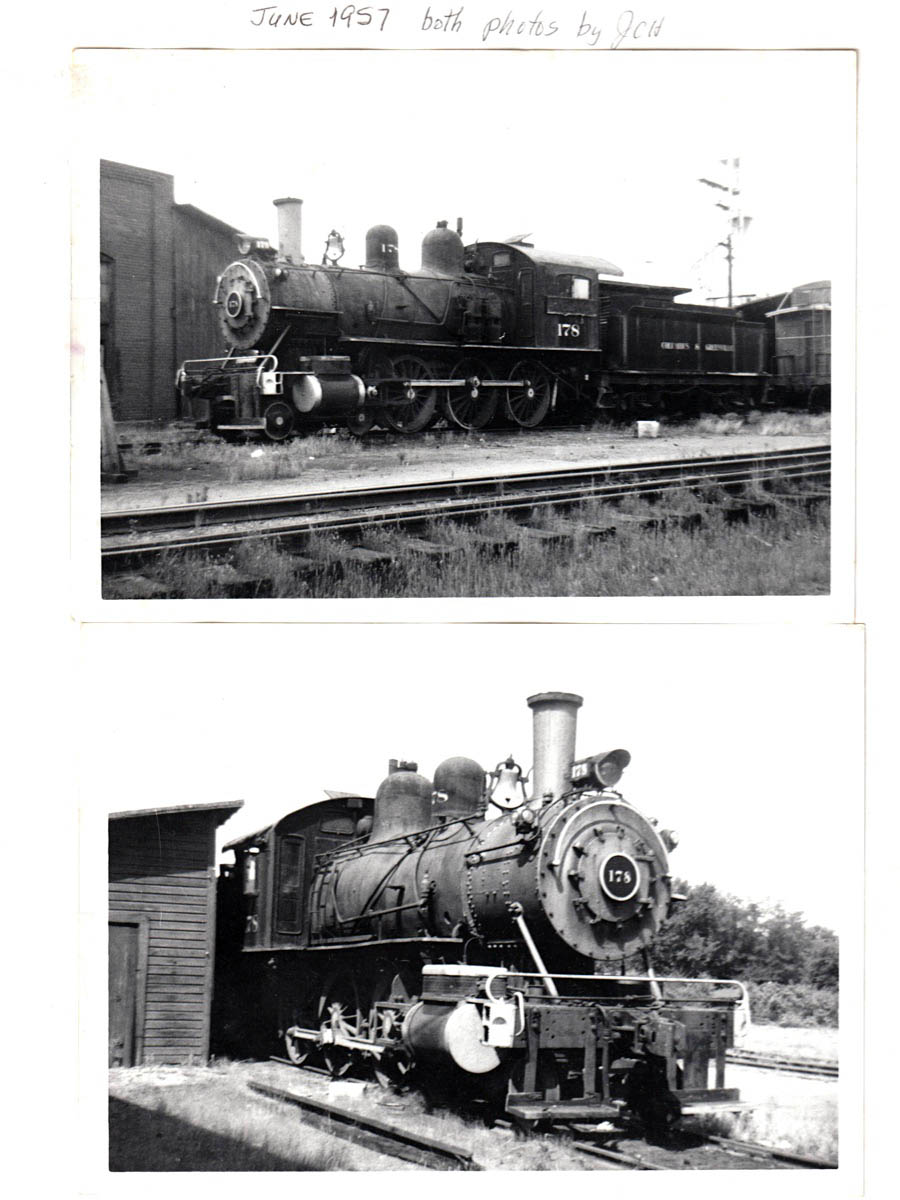
all pages from Columbus & Greenville scrapbook / JCH
Links / Sources
- Louis R. Saillard, Delta Route: A History of the Columbus & Greenville Railway (1981) 96-98
- Richard E. Prince, Southern Railway System: Steam Locomotives and Boats (1970)
- George Drury, Guide to North American Steam Locomotives (Kalmbach, 1993)
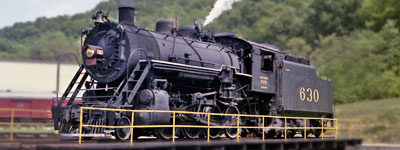
 All time Columbus & Greenville steam locomotive roster
All time Columbus & Greenville steam locomotive roster
